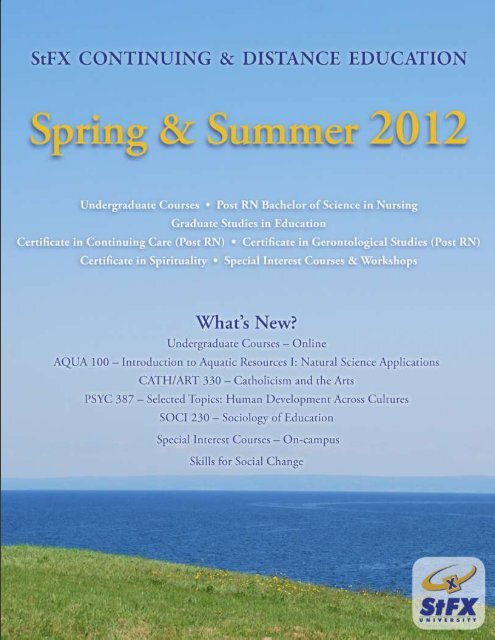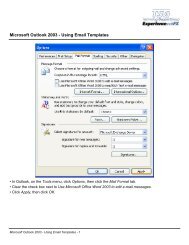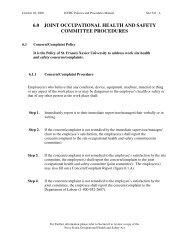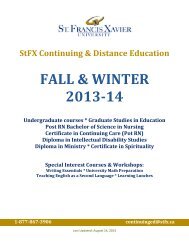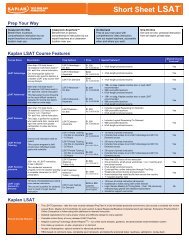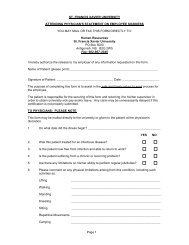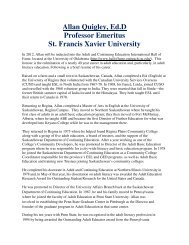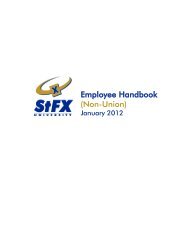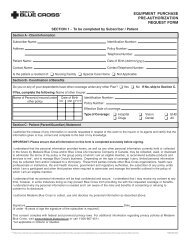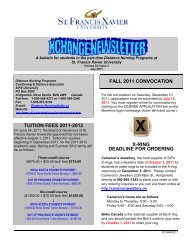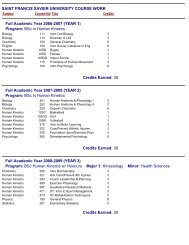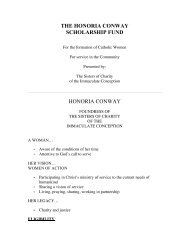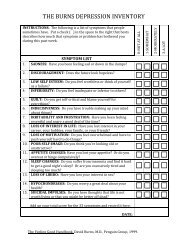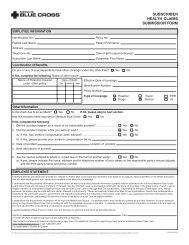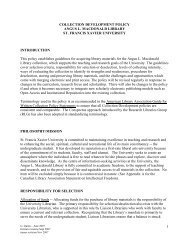Summer Calendar - St. Francis Xavier University
Summer Calendar - St. Francis Xavier University
Summer Calendar - St. Francis Xavier University
Create successful ePaper yourself
Turn your PDF publications into a flip-book with our unique Google optimized e-Paper software.
Last Updated: April 23, 2012
<strong>St</strong>FX Continuing & Distance Education2012 Spring & <strong>Summer</strong> <strong>Calendar</strong>Important Dates ......................................................................................................................................................... 1Part-time <strong>St</strong>udy ......................................................................................................................................................... 1Admission to <strong>St</strong>. <strong>Francis</strong> <strong>Xavier</strong> <strong>University</strong> ................................................................................................................. 2Online Learning .......................................................................................................................................................... 2Technology Support and Guidelines for Computer-based Distance Courses ............................................................ 3<strong>St</strong>udent Email Accounts ............................................................................................................................................. 4Course Registration Information................................................................................................................................ 6Course Drop and Refund ............................................................................................................................................ 8Registration Deadlines ............................................................................................................................................... 8Tuition Fees ................................................................................................................................................................ 8Payment Options ....................................................................................................................................................... 9Course Cancellation ................................................................................................................................................... 9Receipts ................................................................................................................................................................... 10Academic Regulations ............................................................................................................................................. 10Academic Counseling ............................................................................................................................................... 10X-Ring ....................................................................................................................................................................... 11Application for Degrees and Diplomas .................................................................................................................... 11UNDERGRADUATE COURSESSpring Schedule: Antigonish ....................................................................................................................... 12Online .............................................................................................................................. 16<strong>Summer</strong> Schedule: Antigonish ....................................................................................................................... 22Online .............................................................................................................................. 24POST RN PROGRAMS BY DISTANCEPost RN, Bachelor of Science in Nursing .................................................................................................................. 27Certificate in Continuing Care .................................................................................................................................. 27Certificate in Gerontological Nursing ....................................................................................................................... 28Spring/<strong>Summer</strong> Schedule ........................................................................................................................................ 28GRADUATE STUDIES IN EDUCATION: MASTER OF EDUCATION PROGRAMProgram Information ............................................................................................................................................... 29<strong>Summer</strong> Schedule .................................................................................................................................................... 34PHD IN EDUCATIONAL STUDIES .............................................................................................................................. 39SPECIAL INTEREST COURSES & WORKSHOPSCertificate in Spirituality .......................................................................................................................................... 40Mind, Self & Society in Tibetan Buddhism ............................................................................................................... 40<strong>University</strong> Math Preparation ................................................................................................................................... 41Skills for Social Change ............................................................................................................................................. 41Non-credit Workshops / Learning Lunches ............................................................................................................. 42UNIVERSITY SERVICES/INFORMATIONAccommodation ....................................................................................................................................................... 43Bookstore ................................................................................................................................................................. 43Library Services ........................................................................................................................................................ 43Tramble Rooms Centre for Accessible Learning ...................................................................................................... 45The Writing Centre ................................................................................................................................................... 45Sports Complex ........................................................................................................................................................ 45Festival Antigonish ................................................................................................................................................... 45UNIVERSITY DIRECTORY AND CAMPUS MAP ......................................................................................................... 46Please refer to the electronic version of this calendar for updated information, available on the <strong>St</strong>FX Continuing &Distance Education website: sites.stfx.ca/continuingeducation/Last Updated: April 23, 2012
IMPORTANT DATESSee <strong>St</strong>FX Academic <strong>Calendar</strong> for other important dates (www.mystfx.ca/calendar/)January 31April 17April 24June 1June 18June 25July 3Registration opens for Spring & <strong>Summer</strong> undergraduate coursesRegistration deadline for undergraduate spring coursesFirst week of undergraduate spring classes (unless otherwise indicated)Registration deadline for Master in Education summer coursesRegistration deadline for undergraduate summer courses<strong>Summer</strong> undergraduate online courses begin (unless otherwise indicated)<strong>Summer</strong> undergraduate on-campus courses begin (unless otherwise indicated)2012 SPRING AND SUMMER PROGRAMS<strong>St</strong>. <strong>Francis</strong> <strong>Xavier</strong> <strong>University</strong>Antigonish, Nova Scotiasites.stfx.ca/continuingeducation/The <strong>St</strong>FX campus offers a friendly, atmosphere for your on-campus studies. You may also wish to take advantage of themany extracurricular activities that the Antigonish region offers: summer theatre, the Highland Games, beautifulbeaches, scenic drives, and walks.This booklet, covering a range of academic and special interest programs, has been produced by <strong>St</strong>FX Continuing &Distance Education. <strong>St</strong>udents should feel free to call on the Continuing & Distance Education office for assistance.CONTINUING & DISTANCE EDUCATION(Located on the second floor of MacDonald Hall)<strong>St</strong>. <strong>Francis</strong> <strong>Xavier</strong> <strong>University</strong>MacDonald Hall, 2175 Varsity DrivePO Box 5000, Antigonish, Nova Scotia, B2G 2W5Phone: (902) 867-3906Toll-Free: (877) 867-3906Fax: (902) 867-5154Email: continuinged@stfx.camed@stfx.caWeb: sites.stfx.ca/continuingeducation/<strong>St</strong>udents should note, however, that their contacts for information and applications are the addresses or phonenumbers given in each program description. <strong>St</strong>udents are bound by all regulations of the current <strong>St</strong>. <strong>Francis</strong> <strong>Xavier</strong><strong>University</strong> Academic <strong>Calendar</strong>.PART-TIME STUDYMany students are not able to take advantage of full-time studies. To accommodate their circumstances and to assistothers, <strong>St</strong>. <strong>Francis</strong> <strong>Xavier</strong> <strong>University</strong> offers a number of courses/programs through part-time study and distanceeducation.1
ADMISSION TO <strong>St</strong>FXNew students, or students who have already graduated and wish to take additional courses, must apply, pay a $40application fee, and be admitted to the <strong>University</strong> prior to taking courses. The regulations governing admission anddegree requirements are as set forth in the current <strong>St</strong>FX Academic <strong>Calendar</strong>. Prospective students must submit all priortranscripts.The Application for Admission to undergraduate courses can be downloaded fromwww.mystfx.ca/pdfs/general-<strong>St</strong>FX-application.pdfThe Application for Admissions to the Master of Education Program can be found atsites.stfx.ca/continuingeducation/sites/sites.stfx.ca.continuingeducation/files/application-graduate-studies.pdfThe Academic <strong>Calendar</strong> can be found at www.mystfx.ca/calendar or call 877 867-3906 for further information.INTERNATIONAL GRADUATE STUDENTSQualified international students are encouraged to apply for full-time graduate studies in the MEd program. Prospectivestudents should plan to be at <strong>St</strong>FX for a minimum of 13 months (July 1 to July 30 of the following calendar year). If at allpossible international students are encouraged to arrange their travel plans to arrive at <strong>St</strong>FX by the first of July. Forfurther information on international students, please visit our International <strong>St</strong>udent Office website located at thefollowing link: www.stfx.ca/prospective/international/.ONLINE LEARNINGTaking courses online provides a flexible and convenient opportunity for you as a student. Our online platforms includeBlackboard Learn TM (asynchronous or anytime, anywhere) and Blackboard Collaborate TM (synchronous or real time).Many of our courses and programs use Blackboard Learn as the learning management system, providing students withthe flexibility of choosing the time of day or night they wish to participate in their course.Graduate courses (MEd) use Blackboard Learn and Blackboard Collaborate. Collaborate is real-time, meaning you andyour peers are present at the same time. Through Collaborate, you will be able to listen and speak with others andthrough interactive tools, see and share activities. Blackboard Learn is often used for discussions and document sharingthroughout the term.To ensure that you are prepared to be an online learner and to help you prepare for a positive and successful onlineexperience, here are a few tips and suggestions:You must have access to a computer and the Internet on a regular basis. You will need to check your course dailyto participate in discussions and to get course materials and updates. Also, keep your <strong>St</strong>FX email inbox active, asit is the professor’s method of communicating with you.You must be prepared to spend at least 10 hours of study time per week for each course you are taking. Onlinecourses provide flexibility and convenience; however, they do require time, commitment, and attention.Time management skills are important in an online course. Check your course daily for new postings, updates,assignment deadlines, quiz dates, etc. In many courses, weekly schedules are provided to help you stay on track.Blackboard and Collaborate tutorials are available. Participate in a tutorial before the course begins to ensurethat you are prepared for the first class. These tutorials will help your understanding of the transition fromtraditional classroom into an online classroom and ensure you have the required technology to participate.You will be expected to participate and share in discussions by responding to questions posted by the instructoras well as responding to postings by others in your class. This is done in an open, constructive, and friendlymanner. Posting your thoughts/comments provides you the opportunity to reflect on your answers beforeposting them.Technology guidelines for Windows and Mac are provided below.2
TECHNOLOGY GUIDELINES & SUPPORT FOR COMPUTER-BASED DISTANCE COURSESMinimum system requirements for participating in online coursesWindows SpecificationsOperating System:Processor:Memory:Hard Drive Space:Browser:Email:Plug-ins:Quicktime:Java:Modem:Printer:Monitor:Microphone:Windows XP, Vista, Windows 7 or Windows 81 GHz Pentium 4 minimum, 2 GHz Core 2 Duo or better recommended512 MB of RAM minimum, 1 GB recommended1 GB free disk spaceInternet Explorer 7.0 minimum, Google Chrome recommended<strong>St</strong>udents must use their <strong>St</strong>FX email address (provided by TSG)Flash 8 or higher; these are freely downloaded from Adobe: www.adobe.com/downloadsQuicktime 7.6 or better, free download from the Apple website: www.apple.com/downloadsEnvironment 1.5 or newer, download from: www.java.comHigh Speed Cable / DSL recommendedGraphics-capable printer (inkjet or laser)Minimum Specifications: 15-inch, SVGA, 1024 x 768 minimum screen resolution, 16 bit color(thousands of colors).Recommended Specifications: SVGA, 1024 x 768 minimum screen resolution, 24 or 32 bitcolourOnboard or USB microphone / headsetOperating System:Processor:Memory:Hard Drive Space:Browser:Email:Plug-ins:Quicktime:Java:Modem:Printer:Monitor:Microphone:Mac SpecificationsMacintosh OS X 10.4 Tiger or later1 GHz PowerPC G4 minimum, 2 GHz Core 2 Duo or better recommended512 MB RAM minimum, 2 GB Recommended1 GB free disk spaceGoogle Chrome is strongly recommended www.google.com/chrome<strong>St</strong>udents must use their <strong>St</strong>FX email address (provided by TSG)Flash 8 or higher and IF USING SAFARI OR FIREFOX the Schubert|it PDF Plugin is required. Itcan be found at www.schubert-it.com/pluginpdf/Quicktime 7.6 or better, free download from the Apple website:www.apple.com/downloadsLatest Macintosh OS X Java updatesHigh Speed Cable / DSL recommendedGraphics-capable printer (inkjet or laser)Minimum Specifications: 15-inch, SVGA, 1024 x 768 minimum screen resolution, 16 bitcolour (thousands of colours).Recommended Specifications: SVGA, 1024 x 768 minimum screen resolution, 24 or 32 bitcolourOnboard or USB microphone / headsetBlackboard SupportEmail: bbadmin@stfx.caPhone: (902) 867-3971 or 1-877- 867-3971Contact Blackboard Support if you require support for Blackboard or want help with technology issues related to onlinecourses.3
Collaborate Support for Teaching and LearningEmail: fzadeh@stfx.caPhone: (902) 867-5728Contact Farnoush to arrange a Collaborate tutorial.Collaborate Technical Support (24/7)Live Chat: www.presidiumlearning.net/BlackboardCollaborateLivePerson/Information on Collaborate can also be found at:www.blackboard.com/Platforms/Collaborate/Support/Support-for-Blackboard-Collaborate.aspxPhone: 1-877-382-2293STUDENT EMAIL ACCOUNTSYour <strong>St</strong>FX student email account is used for all communication between you and <strong>St</strong>FX. It is vital that you check andmaintain your account regularly.Accessing webmail (your personal <strong>St</strong>FX email account):1. Go to the <strong>St</strong>FX student homepage (www.mystfx.ca/students/)2. Select the Webmail link and enter your user name (e.g., x2011abc) and your applicable password as outlined onyour PIN letter.Changing your Password:1. Go to the <strong>St</strong>FX student homepage2. Click the Webmail link (as noted above in the screenshot)4
3. Click on the ChangePassword link on the leftside of the pageTo view and reset your originalpassword:1. Go towww.mystfx.ca/students/2. Click on Banner/mesAMIS3. Click on STUDENTS onthe right side of thepage, and then selectLog into mesAMIS.4. Log into the systemby using your <strong>St</strong>udentID as your user nameand your 6-digitnumeric password5
5. Select the ‘myAccounts’ link6. Select the ‘Reset Original Password’ at the bottom left side of the pageAll students are required to check their <strong>St</strong>FX email accounts on a regular basis and keep the inbox open for deliveries bydeleting unnecessary emails and changing passwords as required. All information coming from the Program Office, aswell as other university offices will be sent to your <strong>St</strong>FX email account only. If you are unable to access your <strong>St</strong>FX emailaccount, please contact the Technology Support Group at tsg@stfx.ca or phone (902) 876-2356 or toll free at 1-888-560-2356.COURSE REGISTRATION INFORMATIONThe following course registration information is for Undergraduate, Post RN, and Graduate <strong>St</strong>udies in Education. For allother programs, please see specific program information for course registration information.Advanced Registration Required: When you have successfully met admission requirements to <strong>St</strong>FX, you will receive aletter of acceptance from the Admissions Office which contains your <strong>St</strong>FX ID number. In this letter you are asked to callthe Continuing and Distance Education office: 877 867-3906, to register for your first course. At this time, please ask usfor your PIN letter, which will allow you to, among other things, register for future courses on line. Continuing studentsshould follow the online course registration directions below.Those who wish to take a course at <strong>St</strong>FX for credit at another institution must present a letter of permission from theinstitution.6
<strong>St</strong>udents are required to register for all their own courses with exceptions. To register, you must have your ‘PIN Letter’which contains your <strong>St</strong>FX student ID and your 6-digit numeric password. If you are a new student and have not receivedyour PIN letter or if you a returning student having difficulties with our registration process, please contact our ProgramOffice at (902) 867-3906 / 2372 or toll free at 1-877-867-3906.Please note the link below that will bring you to our registration tutorial. This tutorial will guide you through theregistration process step-by-step with screen shots that will help ensure that you are on the right track.1. Select the following link www.mystfx.ca/services/registrar/SelfService.htm2. Click on ‘Log into mesAMIS,’ entering your student ID and your 6-digit numeric PINNote the webregistrationtutorial link3. Select the Registration link and then enter your student ID and your 6-digit numeric PIN once again4. Click on the ‘<strong>St</strong>udent Services’ tab5. Select ‘Registration’ emphasized by the colour purple6. Select the appropriate term, i.e., Full Academic Year 2011-2012, or Spring 2012 or <strong>Summer</strong> 20127. Select Add/Drop Classes8. Input the CRN(s) (Course Reference Number) into the field(s) at the bottom of the page9. Once CRNs are entered, click the ‘Submit Changes’ at the bottom of the screenWhen registering online, please ensure that you print a copy of your ‘myGrades’ report which will include any currentregistration you have in our system. If you do not see any current registration, please contact our Program Office forassistance as this may suggest you have encountered technical difficulties. The ‘myGrades’ link can be accessed throughyour personalized mesAMIS accessed via the right side of Banner @ X Portal or accessible via the following web link:mesamis.stfx.ca/reports/default.htm.NOTE: You may not see the tuition charges immediately on your <strong>St</strong>FX financial details. If you see the course listing onyour myGrades report as ‘IP’ (In Progress) you have registered successfully.7
It is the responsibility of students to know their respective degree patterns; for Master of Education students who wantto ensure they are following the right program pattern, please email med@stfx.ca; for Distance Nursing students pleaseemail distance.nursing@stfx.ca; and for undergraduate degree pattern inquiries please email advising@stfx.ca.COURSE REGISTRATION INFORMATION FOR MASTER OF EDUCATION STUDENTSThe following course registration information is for Graduate <strong>St</strong>udies in Education. For all other programs, please seespecific program information on the applicable web pages or contact our Registrar’s Office; contact information locatedwithin the following link: www.mystfx.ca/services/registrar/For all new students in the Master of Education Program, registration for your first two required courses (EDUC 505 and534) will be done for you by the Program Office. These courses are the two core courses that you will take the summerfollowing your acceptance into our program. Remaining course registration will be done by you. The Program Office willbe available to you should you encounter any difficulties with the process. Note: Registration for EDUC 543, 590, 593,and 599 is also done through the Program Office.COURSE DROP AND REFUNDA student wishing to drop a course should immediately log onto the <strong>St</strong>FX Home Page (www.stfx.ca), click on My<strong>St</strong>FX,and then click <strong>St</strong>udents. Click on Banner / mesAMIS, then STUDENTS and follow the instructions for dropping a course.For assistance please call the Continuing & Distance Education office at (902) 867-2372 or 877 867-3906. Normally, if astudent withdraws in the first week of Spring or <strong>Summer</strong> session, 2/3 of the tuition will be refunded. For withdrawalduring the second week, 1/3 will be refunded. After two weeks, no refunds will be given. In addition, Master ofEducation students will be charged an administration fee of $100.00 for withdrawal from course two weeks prior to thecourse start date or during the course. Contact the program office regarding course drop and refund policies for specificprograms.REGISTRATION DEADLINESApril 17June 1June 18Undergraduate Spring SessionMaster of Education <strong>Summer</strong> SessionUndergraduate <strong>Summer</strong> SessionTUITION FEES FOR PART-TIME STUDENTSUndergraduate Courses are $1,420.00* per six credit course; $710.00* per three credit course. International studentspay (in addition to tuition) $1,420.00* per six credit course.Graduate Courses $710.00* per three credit course. International students pay (in addition to tuition) $710.00* perthree credit course.*Amounts include information and Technology fees and are subject to change by <strong>St</strong>FX Board of Governors.Auditing charges are, in each instance, on-half of the regular fee. Only courses without a laboratory component orhands-on component may be audited. There is no tuition fee for senior citizens 65 years of age and older as per Section7 of the Academic <strong>Calendar</strong>. Proof of age is required.8
Nova Scotia <strong>St</strong>udents:$581.70* per 3-credit course ($710 less applicable Tuition Bursary)$1,163.40* per 6-credit course ($1,420 less applicable Tuition Bursary)Non-Nova Scotia <strong>St</strong>udents:$683.91* per 3-credit course ($710 less applicable Tuition Bursary)$1,367.82* per 6-credit course ($1,420 less applicable Tuition Bursary)International <strong>St</strong>udents:$1,385* per 3-credit course ($710 plus International Fee $675)$2,770* per 6-credit course ($1,420 plus International Fee $1350)*Amounts include information and technology fees and are subject to change by the <strong>St</strong>FX Board of Governors.Auditing charges are in each instance one-half the regular fee. Only courses without a laboratory component or handsoncomponent may be audited. There is no tuition fee for senior citizens 65 years of age and older enrolled in creditcourses. Proof of age is required.PAYMENT OPTIONSAll payment or receipt inquiries are to be addressed to the <strong>St</strong>FX <strong>St</strong>udent Accounts Office (902-867-2123 or 867-3738).The preferred payment option is paying online through your student account, where you can print off your receipt. Youruniversity online banking account number is your <strong>St</strong>FX student ID number. Other payment options include cash, chequeor money order. Cheques are payable to <strong>St</strong>FX <strong>University</strong>.Checking your account balance and making a making a payment on your account:1. Go to the <strong>St</strong>FX student home page (www.mystfx.ca/students/)2. Select BANNER/mesAMIS3. Select the ‘STUDENTS’ link on the right side of the page under mesAMIS Login4. From your homepage under ‘Important <strong>St</strong>uff to Check Out’ select ‘Lookup <strong>St</strong>udent Account Information’5. For student account inquiries, please contact the <strong>St</strong>FX Business Office directly at (902) 867-2123COURSE CANCELLATIONThe university reserves the right to cancel any courses for which there is insufficient advance registration. Should it benecessary to cancel any course students will be notified through their <strong>St</strong>FX student email account.9
RECEIPTST2202As for income tax purposes are available at the Banner/mesAMIS portal at the end of February each year. Thefollowing link will bring you directly to the page displayed in the image below: mesamis.stfx.ca/reports/default.htmReceipts for other purposes may be obtained by calling the <strong>St</strong>FX Business at (902) 867 -2123 / 3738.ACADEMIC REGULATIONSFor information on evaluation procedures and minimum grades, consult the <strong>St</strong>FX Academic <strong>Calendar</strong>. Website:www.mystfx.ca/calendar/.ACADEMIC COUNSELLINGUndergraduate students - call (902) 867-3754 or (902) 867-3636 or email advising@stfx.ca (email is preferable).Distance Nursing students - call Continuing & Distance Education at (902) 867-5186 or toll free at 800-588-2246or email distance.nursing@stfx.ca.Master of Education students - call Continuing & Distance Education at (902) 867-3906 or 877-867-3906 (tollfree) or email med@stfx.ca.Important: If you are not sure what courses fit your degree pattern it is vital that you call the appropriate office (asabove) for academic counseling.STUDENT ID CARDS<strong>St</strong>udent ID cards may be obtained by visiting our Safety and Security Office. The office is located at 5005 Chapel Square.For information call (902) 867-3981.10
X-RINGUndergraduate students in good academic standing at the beginning of their final year of taking courses may considerapplying for the <strong>University</strong>’s X-ring. Master of Education students must be enrolled in 36 credits to apply for their X-ring.The X-ring ceremony takes place on December 3, The Feast of <strong>St</strong>. <strong>Francis</strong> <strong>Xavier</strong>. For information on purchasing your X-ring please call the <strong>St</strong>udents’ Union (902)867-2495. The X-ring webpage can be accessed via www.mystfx.ca/xring/.APPLICATION FOR DEGREES AND DIPLOMASCandidates in their graduating year must apply to graduate. The final date to apply for Fall Convocation is July 15; thefinal date to apply for Spring Convocation is October 1. <strong>St</strong>udents Application must be made online. The application formcan be found on the left side of the Registrar’s Services & Links page. For further information call (902) 867-2160. Note:students who are registered in fall term courses normally will not be eligible for December convocation.11
UNDERGRADUATE COURSESSPRING SESSIONCRN = Course Reference NumberANTIGONISH (ON CAMPUS)April 24 - June 18 (Unless otherwise indicated)Room codes: AX (Annex), JBB (J. Bruce Brown), IM Immaculata Hall), MA (Marguerite), NH (Nicholson Hall), OC (OlandCentre), SW (Swartz School of Business Administration and Information Systems building).ON-CAMPUS SPRINGCOURSESART 100.30DrawingCRN 14222M. MacFarlaneART 125.30Materials and MethodsCRN 14223R. YoungART 145.30Introduction to ColourCRN 14224M. MacFarlaneBIOL 307.30Field BiologyCRN 14225D. Garbary, R. Lauff, M.Pulsifer & N. HillDEVS 391.30Selected Topics: Skills forSocial ChangeCRN 14295B. ForoughiDATESApril 24 - June 189:00 am - 12:00 pmMonday / Tuesday / ThursdayRoom 002, IMMay 24 - June 181:00pm - 4:00 pmMonday / Tuesday / ThursdayRoom 018, IMApril 24 - May 221:00 pm - 4:00 pmMonday / Tuesday / ThursdayRoom 002, IM8:00 am - 10:00pmMonday - SaturdayMay 6 - May 19(Initial meeting will be SundayApril 29 at 7:00 pm)Lab Fee: $75 (in addition totuition)Room 236, BBMay 7 - 25, 2012Monday-Friday8:45am – 12n & 2pm – 5pmInstructor permission is requiredto register for this course.For information/registrationcontact: bforough@stfx.caDESCRIPTIONAn elementary course in drawing and composition withmixed media, including some work in colour. The focuswill be on line, skeletal forms, planes, mass forms, stilllife and the figure. Six credits.<strong>St</strong>udents will create small works in watercolour, oil,acrylic and egg tempera. The goal is a workingknowledge of each medium’s properties, brushhandling, supports, preservation, and threedimensionalart work. Three credits.This course deals with the vocabulary, nature, andphysical properties of colour: hue, value, and intensity.<strong>St</strong>udio assignments provide practice in learning colourrelationships in unified and contrasting colour schemes.Three credits.This course provides practical experience in theobservation, collection, identification, andquantification of organisms in nature. Held for twoweeks in May, the course emphasizes field ecology,dealing with some or all of the following groups oforganisms: birds, small mammals, fish, plants, marinealgae, marine invertebrates, and insects. Prerequisite:BIOL 203. Three credits.This course provides a space for collective explorationof self, community transformation and our role asadvocates of social and economic justice. Whether it isto examine the intricacies of donor relations, the powerof social media in promoting change or the challengesof grassroots organizing, we will encourage one anotherto better understand and be empowered by thepossibilities that exist for community transformation.Three credits.12
ON-CAMPUS SPRINGCOURSESECON 101.30IntroductoryMicroeconomicsCRN 14226S. DodaroECON 102.30IntroductoryMacroeconomicsCRN 14227S. DodaroENGL 240.30Literature of the MiddleEastCRN 14228J. KhouryENGR 136.30<strong>St</strong>aticsCRN 14296Lab CRN 14297E. OguejioforHIST 255.30History of Colonial LatinAmericaCRN 14229C. FrazerDATESApril 24 - May 226:00 pm - 9:00 pmMonday / Wednesday /ThursdayRoom 201, IMMay 23 - June 186:00 pm - 9:00 pmMonday / Wednesday /ThursdayRoom 345, NHApril 24 - May 229:00 am - 12:00 pmMonday / Tuesday / ThursdayRoom 345, NHMay 22 – June 189:00 am – 12:00 pmMondays/Tuesdays/ThursdaysLab: Fridays, 9 am – 12pmMay 2, June 1, 8, 15April 24 - May 226:00 pm - 9:00 pmTuesday / Wednesday /ThursdayRoom 154, NH13DESCRIPTIONThis course provides an introduction to themicroeconomic concepts and methodology. <strong>St</strong>udentswill learn about basic concepts such as scarcity andopportunity cost, and economic efficiency. The othercentral themes of the course include theories of supplyand demand; the theory of production and costs, thefunctioning and the performance of competitivemarkets versus monopolies and oligopolies; labourmarkets and the markets for public goods. Threecredits.The second half of introductory economics provides anintroduction to macroeconomic concepts. The courseexamines pressing problems and issues in the Canadianeconomy and the world. <strong>St</strong>udents will learn aboutalternate economic systems, national incomeaccounting and the components of the nationaleconomy; the role of money in the economy; inflation;unemployment; international trade and trade policy;and the role of government in managing the economy.Prerequisite: ECON 101 recommended. Three credits.This course will introduce students to the rich literaryheritage of various countries in the Middle East.<strong>St</strong>udents will read traditional poetry and folk tales, withthe main focus on the novel and the short story of the20th century. Writers to be studied may include NajibMahfuz, Elias Khoury, Hanan al-Shaykh, GhassanKanafani, Tayeb Salih, Muhammad Shukri. Threecredits.Covers statics of particles and rigid bodies. Designed toteach the principles and application of mechanics, andto develop an analytical approach to solving problems.Vector analysis is used extensively. Three credits andlab.This is a survey of Spanish and Portuguese Americafrom the 15th century to the 19th century. Topics andthemes include the indigenous, African and Iberianheritages of Latin America; the clash of civilizations andconquest in the Americas; the interaction of diversecultures and the creation of new societies; the social,economic and cultural evolution of colonial LatinAmerica; the age of piracy and challenges to theSpanish and Portuguese empires; the rise of hierarchiesand inequalities based on gender, sexuality, ethnicityand class; and the struggle for independence. Threecredits.
ON-CAMPUS SPRINGCOURSESHIST 283.30British EmpireCRN 14230R. SempleHKIN 226.30Focus on Personal HealthCRN 14231P. Gallant / L. GallantHKIN 321.30Advanced Care andPrevention of AthleticInjuriesCRN 14283T. SutherlandHKIN 365.30Exercise PhysiologyCRN 14232Lab CRN 14233R. RasmussenMATH 111.30Calculus ICRN 14234Lab CRN 14235J. ArchibaldMATH 205.30Business MathematicsCRN 14236P. WangDATESMay 23 - June 189:00 am - 12:00 pmTuesday / Wednesday /ThursdayRoom 156, NHApril 24 - May 105:30 pm - 8:30 pmMonday - ThursdayRoom 207, OCMay 14 – 30Monday – Friday9:00 am – 12:00 pmRoom 209, OCApril 24 - May 118:15 am - 12:00 pm (includeslabs)Monday - FridayRoom 209, OCRoom Lab 205A, OCApril 24 - May 221:00 pm - 4:00 pmMonday / Wednesday /ThursdayRoom 124, AXApril 24 - May 226:00 pm - 9:00 pmTuesday / Wednesday /ThursdayRoom 23A, AX14DESCRIPTIONBritain was the world’s first modern superpower. Itdominated the world politically, economically, militarilyand culturally. This course will examine both themeasurables of imperial economic and politicaldomination, but also the intangibles; Britonsthemselves came to believe that they exemplifiednational characteristics that denoted imperial rulers.What all led to that mindset, and how was that viewedby subject populations? Regional studies will enable usto understand the relationship between metropole andsettlers and administrators and colonial populations.Three credits.This multidisciplinary course addresses personal healthand lifestyle choices of university students. Topicsinclude psychological health, nutrition, physical activity,the environment, dieting, obesity, drugs, sexuality, anddeath. Three credits.This course is an in-depth study of the assessment andmanagement of athletic injuries. <strong>St</strong>udents will learnproper assessment protocol, advanced assessmenttechniques, and specialized taping techniques.Prerequisite: BIOL 251; HKIN 222. Three credits.This course involves an in-depth study of the energydelivery systems utilized during exercise, as well as boththe acute responses and chronic adaptations toexercise by the muscular, cardiovascular, andrespiratory systems. Basic neurological considerationsare also included. Prerequisites: BIOL 251, 252. Threecredits and a lab.This course is an introduction to differential calculus ofa single variable, with applications to the physical, life,and social sciences. Topics include limits; differentiationof polynomial, exponential, logarithmic, andtrigonometric functions; inverse functions and theirderivatives; implicit differentiation; curve sketching,and applied max-min problems. Prerequisite: Grade 12pre-calculus or equivalent. Three credits.This course is a presentation of mathematics applicableto business, including functions, modeling, linearprogramming, matrix algebra, interest, and annuities.Use of spreadsheets will be a fundamental part of thiscourse. Acceptable for credit in the Faculties of Arts andBusiness. Three credits.
ON-CAMPUS SPRINGCOURSESPSYC 220.30Cognitive PsychologyCRN 14237Lab CRN 14291P. McCormickPSYC 377.30Drugs and BehaviourCRN 14238K. BrebnerPSYC 378.30Human SexualityCRN 14239A. WeaverPSYC 380.30Forensic PsychologyCRN 14279M. WattRELS 110.30An Introduction to WorldReligionsCRN 14240G. MelchinSOCI 310.30GenderCRN 14241D. SmytheDATESApril 24 - June 186:00 pm - 9:00 pmTuesday / Wednesday /ThursdayRoom 124, AXApril 24 - June 189:00 am - 12:00 pmMonday / Tuesday / ThursdayRoom 337, JBBApril 24 - May 229:00 am - 12:00 pmMonday / Wednesday /ThursdayRoom 113, AXApril 24 – June 189:00 am – 12:00 pmMonday/Tuesday/WednesdayRoom 305, JBBLab Fee: $75 (in addition totuition)April 24 - June 181:00 pm - 4:00 pmMonday / Tuesday / WednesdayRoom 156, NHApril 24 - June 189:00 am - 12:00 pmMonday / Wednesday / FridayRoom 152, SWDESCRIPTIONThis course deals with the basic cognitive processes:perception, attention, memory, language, thinking andproblem solving. Prerequisite PSYC 100. Six credits.This course examines current perspectives and researchon the various classes of psychological abnormality.Courses in learning, brain and behavior, and personalityform a useful background for this course. Prerequisite:12 credits of PSYC. Six credits.This course provides a broad introduction to researchand theory in human sexuality. It includes examinationof fundamental topics such as the nature of humansexuality and also covers contemporary issues/topics.Specific topics addressed will include: historicalperspectives, theories of sexuality, sex research, sexualanatomy, sexual variation, sexual response, gender,sexual dysfunction and sex therapy. Prerequisite: 12credits PSYC. Cross-listed as WMGS 378. Three credits.This lecture and seminar course will focus on therelationship between psychology and law. Coursecontent will include the history of the relationshipbetween psychology and law; basic concepts in criminaljustice and the study of crime; and the nature ofoffending from a psychological perspective. Restrictedenrolment. Prerequisite: 12 credits PSYC, including PSYC370 or permission of the department chair. Field tripcomponent. Six credits.An introduction to the study of religion will be followedby a detailed consideration of the history, sacredliterature, beliefs, practices, institutions, andcontemporary situation of a number of religioustraditions: Hinduism, Buddhism, Taoism andConfucianism, Shinto, Judaism, Christianity, and Islam.Six credits.The course will examine the origin and persistence ofgender-based inequalities in our society and theirimpact on personal lives. Biological, psychological,economic, and cultural analyses of male-female socialrelations will be considered. Cross-listed as WMGS 310.Six credits.15
ON-CAMPUS SPRINGCOURSESSTAT 231.30<strong>St</strong>atistics for <strong>St</strong>udents inthe SciencesCRN 14242Lab CRN 14282A. SarhanWMGS 310.30GenderCRN 14243D. SmytheWMGS 378.30Human SexualityCRN 14290A. WeaverDATESApril 24 - May 229:00 am - 12:00 pmMonday / Tuesday / ThursdayRoom 254, NHApril 24 - June 189:00 am - 12:00 pmMonday / Wednesday / FridayRoom 152, SWApril 24 - May 229:00 am - 12:00 pmMonday / Wednesday /ThursdayRoom 113, AXDESCRIPTIONTopics include descriptive statistics; data collection,tabulation, and presentation; measures of centraltendency and variability; elementary probability;binomial, normal and chi-square distributions;parameter estimation and tests of hypotheses; linearregression and correlation. <strong>St</strong>udents will learn aboutstatistical significance and the communication ofstatistical evidence and be introduced to a statisticscomputer package. Prerequisite: MATH 112 or 122.Credit will be granted for only one of STAT 231 andSTAT 201, 224, PSYC 292. Three credits and a one-hourlab.The course will examine the origin and persistence ofgender-based inequalities in our society and theirimpact on personal lives. Biological, psychological,economic, and cultural analyses of male-female socialrelations will be considered. Cross-listed as SOCI 310.Six credits.This course provides a broad introduction to researchand theory in human sexuality. It includes examinationof fundamental topics such as the nature of humansexuality and also covers contemporary issues/topics.Specific topics addressed will include: historicalperspectives, theories of sexuality, sex research, sexualanatomy, sexual variation, sexual response, gender,sexual dysfunction and sex therapy. Prerequisite: 12credits PSYC. Cross-listed as PSYC 378. Three credits.ONLINEONLINE SPRING COURSES DATES DESCRIPTIONAQUA 100.66Introduction to AquaticResources l: Natural ScienceApplicationsApril 24 - July 3 This course explores the living and non-living characteristics thatdetermine the nature of aquatic resource ecosystems and examineshuman interaction with these resources. Case studies exposestudents to the natural as well as some of the social scienceapplications of aquatic resource use. Not open to studentsmajoring in Aquatic Resources. Six credits.ART 330.66Catholicism and the ArtsCRN 14249S. <strong>St</strong>ewartApril 24 - June 18The primary purpose of this course is to examine the Christiantradition as it is expressed in literature: biblical figures and events,liturgical traditions, religious symbols, and Christian themes thathave appeared, across the ages, in poetry, drama, fiction, and nonfictionprose. As well, it considers how these Christian elementsappear in visual art (and architecture). The course focuses primarilyon Catholicism. However, it necessarily encompasses the ProtestantReformation, as well, which significantly influenced England, thehome of our English literary tradition, beginning in the 16 th century.Cross-listed as CATH 330. Six credits.16
ONLINE SPRING COURSES DATES DESCRIPTIONBIOL 220.66Selected Topics in BiologyCRN 14245V. KarunakaranMay 28 - August 6 This course is for non-science students who are interested inunderstanding biological concepts. The course deals with “howscientific principles are established” and illustrates this bydiscussing selected topics of biological and human interest. Topicsinclude: evolution and population, diabetes, homeostasis, HIV andvaccines, antibiotic resistance, and cancer. Six credits.BSAD 221.66Introductory FinancialAccountingCRN 14246April 24 - June 18This course is an introduction to basic concepts, principles, andprocedures underlying financial accounting and financial statementpreparation. Required for all BBA students; a prerequisite for all 300and 400 level financial accounting and finance courses.Prerequisite: second-year status or higher. Three credits.D. GunnBSAD 415.66Electronic BusinessCRN 14247G. TritesCATH 330.66Catholicism and the ArtsCRN 14248S. <strong>St</strong>ewartApril 24 - June 18April 24 - June 18Business is increasingly conducted through electronic means, oftenon the Internet. This presents many challenges, includingtechnology, marketing, strategy, operation, and systems issues. Thiscourse explores the current state of electronic commerce, relevantissues, and their relative importance to the success of a businessventure. <strong>St</strong>udents will read case studies and analyze existingbusiness ventures on the Internet. Cross-listed as INFO 446. Threecredits.The primary purpose of this course is to examine the Christiantradition as it is expressed in literature: biblical figures and events,liturgical traditions, religious symbols, and Christian themes thathave appeared, across the ages, in poetry, drama, fiction, and nonfictionprose. As well, it considers how these Christian elementsappear in visual art (and architecture). The course focuses primarilyon Catholicism. However, it necessarily encompasses the ProtestantReformation, as well, which significantly influenced England, thehome of our English literary tradition, beginning in the 16 th century.Cross-listed as ART 330. Six credits.17
ONLINE SPRING COURSES DATES DESCRIPTIONENGL 298.66Selected Topics:Introduction to CreativeWriting: Short FictionCRN 14250A. SimpsonApril 24 - June 18 This course will introduce students to short fiction and give them apractical tool kit for developing their own short story writing.<strong>St</strong>udents will through writing, reading and revising their ownwritten work, through critiquing the work of their peers andthrough reading and discussing aspects of short fiction. Throughoutthe course, the following subjects will be covered: planning andintroducing the story, developing rounded characters and writingeffective dialogue, developing plot and structure, considering thesignificance of setting and details, choosing point of view,considering the elements of fictional time, sharpening and clarifyinglanguage, ending the story, and revising it for stronger impact. Thecourse will run as a workshop, so student participation will beconstant throughout. As part of the application process studentsare asked to submit a sample of short fiction, double spaced(minimum two pages, maximum three pages). Each student is alsoasked to submit a cover letter explaining his or her interest in thecourse and mentions any fiction writing done to date. The letter,together with the writing sample, may be submitted as an e-mail (toasimpson@stfx.ca by April 16, 2012). Three credits. PrerequisiteENGL 100 or 110.ENGL 340A.66Shakespeare: NarrativePoems, Comedies andSonnetsCRN 14251J. PopeESCI 171.66Understanding the Earth ICRN 14252C. MurphyApril 24 - June 18April 24 - June 18This upper-level, three credit survey course on Shakespeare’s worksincludes the narrative poems, a representative selection ofcomedies, and the Sonnets. After an overview to the cultural,religious, and political environment of the late 16 th century inEngland, we proceed with a reading, discussion and analysis ofVenus and Adonis (1593), and the Rape of Lucrece (1594), beforewe launch into the Comedy of Errors (1594), followed by aMidsummer Night’s Dream (1594-1596), and As You Like It (1598-1600). The course concludes with a reading of the Sonnets.Prerequisite: ENGL 100 or ENGL 110. Three credits.This course explores the Earth around us, the processes that haveshaped the past and the present, and the implications for ourfuture. With an understanding of Earth's dynamic nature, we willcover topics on continental drift and plate tectonics, origins ofvolcanoes, earthquakes and mountains; and explore thecomposition and structure of solid Earth to its deep interior. Therelationship between the hydrosphere, (freshwater and ouroceans), and the geosphere, (solid Earth), will include discussionson ocean basin development, ocean water chemistry andcirculation, El Niño, the hydrologic cycle, and both surface andgroundwater resources. Three credits.18
ONLINE SPRING COURSES DATES DESCRIPTIONHIST 399.66Selected Topics: CanadianImmigration, Race andEthnicity Since 1896CRN 14253J. CameronApril 24 - June 18 This course traces the history of Canadian immigration, settlement,ethnicity, race relations, and multiculturalism since 1896. Itexamines influential immigrant movements, such as the settlementof western Canada, the Home Children, the War Brides, and postwarrefugees. Other topics include the role of Pier 21 in Halifax, theVancouver Riot of 1907, illegal immigration, and anti-Semitism. Itprovides an opportunity to look at Canada, past and present,through the eyes of immigrants and diverse ethnic groups, and toexamine the responses and policies of the receiving society. Threecredits.HKIN 301.66Elementary <strong>St</strong>atisticsCRN 14254J. ApalooINFO 446.66Electronic BusinessCRN 14255G. TritesMATH 111.66Calculus ICRN 14256Lab CRN 14257P. WangNURS 260.66/67/68/69Developmental PsychologyCRN 14258CRN 14259CRN 14260CRN 14288Lab CRN 14277P. Hauf / J. SullivanApril 24 - June 18April 24 - June 18April 24 - June 18April 24 - July 16This course teaches statistics for students in business and arts.Topics include: descriptive statistics; data collection, tabulation, andpresentation; measures of central tendency and variability;binomial, normal, and chi-square distribution; estimation ofparameters and tests of hypothesis; simple linear regression andcorrelation; introduction to statistical computer package. Crosslistedas STAT 201. Three credits.Business is increasingly conducted through electronic means, oftenon the Internet. This presents many challenges, includingtechnology, marketing, strategy, operation, and systems issues. Thiscourse explores the current state of electronic commerce, relevantissues, and their relative importance to the success of a businessventure. <strong>St</strong>udents will read case studies and analyze existingbusiness ventures on the Internet. Cross-listed as BSAD 415. Threecredits.This course is an introduction to differential calculus of a singlevariable, with applications to the physical, life, and social sciences.Topics include limits; differentiation of polynomial, exponential,logarithmic, and trigonometric functions; inverse functions andtheir derivatives; implicit differentiation; curve sketching, andapplied max-min problems. Prerequisite: Grade 12 pre-calculus orequivalent. Three credits.This course is a study of major environmental and maturationalinfluences and their relationship to the growing person. Labcomponent included. Prerequisite: PSYC 100. Cross-listed as PSYC260. Six Credits19
ONLINE SPRING COURSES DATES DESCRIPTIONPSCI 345.66Women and PoliticsCRN 14261L. <strong>St</strong>anApril 24 - June 18 This course is an introduction to the study of women and politicsand to the contemporary feminist debates and dilemmas that relateto the subject. The course is comprised of three main elements: 1)feminist studies and political science, 2) women and formal politics,and, 3) women’s status around the world. Topics include thevarieties of feminist political thought in the western politicaltradition, the evolution and politics of women’s movement,women’s participation in political parties and legislatures inselected countries, women and work, and the situation of women inAfrican and predominantly Muslim countries. The course includeskey dimensions of political science: comparative politics, publicpolicy, Canadian politics, and political theory. Cross-listed as WMGS345. Three credits.PSYC 100.66Introduction to PsychologyCRN 14262April 24 - July 30This course is a survey of the major topics of psychology as well asan introduction to the methodology of psychological research. PSCY100 is a prerequisite for all other courses in psychology, exceptPSYC 290 and 390. Six credits.Z. HayesPSYC 260.66/67/68/69Developmental PsychologyCRN 14263CRN 14264CRN 14265CRN 14289Lab CRN 14278P. Hauf / J. SullivanPSYC 385.66Selected Topics: CulturalPsychologyCRN 14266T. CallaghanApril 24 - July 16April 24 - June 18This course is a study of major environmental and maturationalinfluences and their relationship to the growing person. Labcomponent included. Prerequisite: PSYC 100. Cross-listed as NURS260. Six credits.The question of how culture influences human behavior and mindwill be explored. For many years research and theory in psychologyhave been based on studies conducted primarily in Westerntechnological societies. There is growing concern that the basicprinciples of the discipline may not apply in other cultural contexts.The course will consider the historical roots of studying culture inpsychology and related disciplines, the socialization of infants andyoung children into the practices and routines of the culture, andevolutionary, developmental and cultural influences on the buildingand maintaining of human relationships. Varieties of experiencesand practices related to mental and physical health that exist in thecultures of the world will also be considered. The course willprovide a comprehensive review of contemporary research findingsand theoretical viewpoints as the many facets of this fast-growingdiscipline of psychology are explored. Three credits.20
ONLINE SPRING COURSES DATES DESCRIPTIONRELS 398.30Selected Topics: Mind, Self& Society in TibetanBuddhismJune 11 – July 3CRN 14307A. SandnessJune 11 - 22 –Bb Collaborate -students require ahead set ormicrophone andspeakersJune 26 – July 3 –on-site atGampo Abbey,Cape Breton, NSThis course provides a study of the historical development of theBuddhist tradition, with a focus on its Indian origins, followed by anexamination of the ethical and philosophical underpinnings ofBuddhist monastic tradition. A variety of contemplative techniqueswhich form the basis of Buddhist practice in community will also beexamined. This course culminates in a one week on-site experienceof Buddhist monastic practice at Gampo Abbey in Cape Breton,Nova Scotia. Three credits.Room & Board (Gampo Abbey) is in addition to tuition: $400.<strong>St</strong>udents are responsible for their own transportation.Instructor permission is required to register for this course.SOCI 100.66Introduction to SociologyCRN 14267D. MacDonaldSOCI 210.66Sociology of Marriage andFamilyCRN 14268N. VerbergSTAT 201.66Elementary <strong>St</strong>atisticsCRN 14269J. ApalooWMGS 210.66Sociology of Marriage andFamilyCRN 14271N. VerbergApril 24 - June 18April 24 - June 18April 24 - June 18April 24 - June 18For information/registration contact: mlmacinn@stfx.caor call 1-877-867-5561 or (902) 867-5561Sociology provides tools for understanding a wide range of humanexperience and action, from the search for identity, to strugglesagainst exploitation, to the making of new “global” world order.This course introduces the basic concepts and methods ofsociology, helps students make sense of the social world, andexplores the extent and limits of our capacity to change the socialworld. Six credits.This course analyzes the institution of the family from a sociologicalperspective. Attention is given to macro and micro levels ofanalysis. <strong>St</strong>atistical profiles of family patterns are employed toilluminate change in family structure over the past century. Topicsinclude marriage, fertility, parenting, family violence, divorce, andfamily policy. Cross-listed WMNS 210. Six credits.Prerequisite: SOCI 100.This course teaches statistics for students in business and arts.Topics include: descriptive statistics; data collection, tabulation, andpresentation; measures of central tendency and variability;binomial, normal, and chi-square distribution; estimation ofparameters and tests of hypothesis; simple linear regression andcorrelation; introduction to statistical computer package. Crosslistedas HKIN 301. Three credits.This course analyzes the institution of the family from a sociologicalperspective. Attention is given to macro and micro levels ofanalysis. <strong>St</strong>atistical profiles of family patterns are employed toilluminate change in family structure over the past century. Topicsinclude marriage, fertility, parenting, family violence, divorce, andfamily policy. Cross-listed SOCI 210. Six credits.Prerequisite: SOCI 100.21
ONLINE SPRING COURSES DATES DESCRIPTIONWMGS 345.66Women and PoliticsCRN 14270L. <strong>St</strong>anApril 24 - June 18 This course is an introduction to the study of women and politicsand to the contemporary feminist debates and dilemmas that relateto the subject. The course is comprised of three main elements:1) feminist studies and political science, 2) women and formalpolitics, and, 3) women’s status around the world. Topics includethe varieties of feminist political thought in the western politicaltradition, the evolution and politics of women’s movement,women’s participation in political parties and legislatures inselected countries, women and work, and the situation of women inAfrican and predominantly Muslim countries. The course includeskey dimensions of political science: comparative politics, publicpolicy, Canadian politics, and political theory. Cross-listed as PSCI345. Three credits.UNDERGRADUATE COURSESSUMMER SCHOOLJuly 3 - August 13 (Unless otherwise indicated)See registration deadlines and registration procedures.ANTIGONISH (ON CAMPUS)Room Codes: AX (Annex), IM (Immaculata Hall), NH (Nicholson Hall), PS (Physical Science Complex), SW (Swartz Schoolof Business Administration and Information Systems building), JBB (J. Bruce Brown Building)ON-CAMPUS SUMMERCOURSESArt 115.40Introduction to Design ICRN 14001R. YoungART 200.40Painting ICRN 14002K. Brown GeorgallasART 211.40<strong>St</strong>ained Glass <strong>St</strong>udio ICRN 14003J. FecteauJuly 3 - 23DATES8:00 am - 10:30 amMonday - FridayRoom: 019, IMJuly 3 - August 131:00 pm - 4:00 pmMonday - ThursdayRoom: 021, IMJuly 24 - August 138:00 am - 10:30 amMonday - FridayRoom: 018, IMDESCRIPTIONThis studio course introduces basic design elements and principlesproviding students with a working knowledge of how visualcommunication is structured. Three credits.An introduction to watercolour and acrylic painting techniques.Work on drawing skills, design, color and composition will beemphasized. Prerequisite : ART 100 or portfolio demonstratingdrawing and design skills. Six credits.Original design and color compositions are combined with studiowork in stained glass. Three credits.22
ON-CAMPUS SUMMERCOURSESCHEM 100.40General ChemistryCRN 14004CRN Lab 14005G. MarangoniHIST 320.40The USSR, 1917 – 1991CRN 14006G. LalandeHIST 387.40<strong>St</strong>uart BritainCRN 14007P. PhillipsINFO 101.40Introduction toInformation Systems ICRN 14008TBAINFO 102.40Introduction toInformation Systems IICRN 14009TBADATESJuly 3 - August 138:30 am - 11:30 amMonday - FridayLabs:1:30 pm - 4:30 pmMonday / Tuesday /ThursdayTutorials:1:30 pm - 4:30 pmWednesday / FridayRoom 3046, PSLab: Room 2010, PSJuly 3 - August 136:00 pm - 9:00 pmMonday - ThursdayRoom 361, NHJuly 3 - 238:00 am - 10:30 amMonday - FridayRoom 254, NHJuly 3 - 231:00 pm - 4:00 pmTuesday - FridayRoom 152, SWJuly 24 - August 131:00 pm - 4:00 pmTuesday - FridayRoom 152, SWDESCRIPTIONIn this course students will explore the fundamental principles ofchemistry, including atomic and molecular structure, bonding,elementary thermo-chemistry and thermodynamics, oxidationreductionreactions, kinetics and equilibrium reactions withparticular reference to the behavior of solutions, and anintroduction to organic chemistry. This course emphasizes theapplication of chemical principles in areas of interest to students inthe life sciences. Six credits and lab.This course examines the fall of the tsarist regime; the ideologicalroots of the Bolshevik Revolution; the economic, social, cultural,and political developments of the Soviet Union, from Lenin toGorbachev; the failure of Soviet communism. Six credits.Beginning with the reign of James I in 1603 and ending with thedeath of Queen Anne in 1714, this course will examine one of themost turbulent periods in British history. <strong>St</strong>udents will explore thecauses and consequences of the English Civil War and therevolutions of the 17th century. Three credits.This course covers the organizational use of informationtechnology. Topics include IS hardware, software, data;telecommunication networks; the Internet; and informationtechnology infrastructure. Technical segment includes wordprocessing; spreadsheets; presentation software; databasemanagement systems software; Internet search tools; and webpage publishing. Applications of these tools and knowledge will beoriented towards business problems. Three credits.This course introduces the conceptual foundations of informationsystems, focusing on organizational use with emphasis oninformation management. Topics include the impact of IS uponorganizations and society; decision-making in a digital age;business process integration; enterprise systems; supply chainmanagement; e-commerce; types of information systems;information resource management; knowledge-based IS; analysisand design of information systems. Prerequisite: INFO 101. Threecredits.23
ONLINEONLINE SUMMER COURSES DATES DESCRIPTIONART 141.66History of Art ICRN 14010L. QuigleyJune 25 - August 20 A survey of the visual arts in the western world from prehistoriccave paintings to the great Gothic cathedrals of the late MiddleAges. This will include the art of the ancient world-Egypt, Greeceand Rome-as well as Byzantine, Islamic and European art of theMedieval period. Credit will be granted for only one of ART 141and ART 341. Three credits.BSAD 231.66Foundations of MarketingCRN 14011B. MukerjiENGL 233.66Children’s Literature: 1865to PresentCRN 14012C. RushtonENGL 340B.66Shakespearean TragedyCRN 14013J. PopeESCI 471.66Geographic InformationSystemsCRN 14014CRN Lab 14015M. SchumacherJune 25 - August 20June 25 - August 20June 25 - August 20June 25 - August 20Customers do not buy products; they buy benefits, satisfactions,and solutions to their problems. This course provides students withthe customer and marketplace focus central to effectivemarketing. The course employs exercises and cases to developstudents’ analytical skills and provides opportunities todemonstrate these skills through memos and reports.Prerequisites: BSAD 101, 102. Three creditsUsing the landmark publication of Lewis Carroll’s Alice’sAdventures in Wonderland as a starting point, this course providesa critical survey of children’s literature in Britain, America, andCanada. Authors to be studied include Carroll, L.M. Montgomery,E.B. White, Roald Dahl, Maurice Sendak, Judy Blume, Kevin Major,Dennis Lee, and Sheree Fitch. Credit will be granted for only one ofENGL 233 and ENGL 234. Three credits.This upper level three credit survey course on Shakespeare’s worksincludes a representative selection of tragedies from the firstdecade of the 17 th century. After an introduction to the cultural,religious, and political environment of the late Elizabethan periodand early Jacobean period, which includes a discussion of tragedyas a literary genre, we proceed with a reading and analysis ofHamlet (1601/02); Othello (1602/03), King Lear (1607/08), focusingon the Conflated Text in your Norton edition. We end the coursewith a reading of Shakespeare’s romance, The Tempest, which firstappeared in the Folio edition of Shakespeare’s works in 1623.Prerequisite: ENGL 100 or ENGL 110 and ENGL 340A. Three credits.<strong>St</strong>udents will learn how GIS tools can be used to analyze, representand model geographic data derived from censuses, surveys, maps,aerial photographs, and satellite imagery. Topics includecartography and map projections; spatial and attribute data; datacapture techniques; vector and raster structure; GIS analysis; datavisualization; GIS modeling. Prerequisite: permission of theinstructor. Cross-listed as INFO 374. Three credits and lab.24
ONLINE SUMMER COURSES DATES DESCRIPTIONINFO 225.66Information SystemsHardware and SoftwareCRN14016H. MarziJune 25 - August 20 This course covers the fundamentals of computer hardware,system software, and data representation in computer system. Thematerial is designed for students who will be information systemsprofessionals and need to understand the basic underlyingcomponents and architecture of computers in order to makeknowledgeable decisions about computer hardware and systemsoftware. The course discusses processor technology, and inputoutput devices in computer. Various data storage and memory arediscussed. Operating systems will be described. Prerequisite: INFO255 & INFO 256. Credit will be granted for only one of INFO 225,CSCI 365, 375. Three credits.INFO 374.66Geographic InformationSystemsCRN 14017CRN Lab 14018M. SchumacherMATH 112.66Calculus IICRN 14019Lab CRN 14020P. WangMUSI 118.66World MusicCRN 14021T. O’MahoneyJune 25 - August 20June 25 - August 20June 25 - August 20<strong>St</strong>udents will learn how GIS tools can be used to analyze, representand model geographic data derived from censuses, surveys, maps,aerial photographs, and satellite imagery. Topics includecartography and map projections; spatial and attribute data; datacapture techniques; vector and raster structure; GIS analysis; datavisualization; GIS modeling. Prerequisite: permission of theinstructor. Cross-listed as ESCI 471. Three credits and lab.This course is an introduction to integral calculus for functions ofone variable. Topics include: definite and indefinite integrals, thefundamental theorem of calculus, methods of integration,numerical approximation of definite integral, applications to areaand volume, probability density functions and distributions,differential equations, and Taylor polynomials. Prerequisite: MATH111. Three credits.This survey course is an introduction to various popular musictraditions from around the world. Although the course focuses onpopular music, the course also explores how the folkloric andindigenous musical traditions helped shape the contemporarymusical sound of that region or country. The goal of the course isto introduce the learner to the musical characteristics as well asthe social and spiritual implications that make each region’s musicdistinct and interesting. The historical development of the music,melodic/rhythmic/ harmonic/formal structures, indigenousinstruments, the role of singing, significant musical occasions,recent changes in musical traditions, and current popular musicstyles (possibly derived from folkloric styles) will be presented. Thecourse will focus on the music of the Caribbean region, LatinAmerica, Brazil, Europe, Sub-Saharan Africa, South Asia (India), theMiddle East, and Southeast Asia (Japan, China, Thailand andIndonesia). There are no prerequisite for this course and itsdelivery should be easily understood by all students, regardless ofprevious musical experience. Three credits.25
ONLINE SUMMER COURSES DATES DESCRIPTIONPSCI 295.66Religion and PoliticsCRN 14022L. <strong>St</strong>anJune 25 - August 20 This course is an examination of the impact of religion on politicsand politics on religion. <strong>St</strong>udents will consider the relationshipbetween religion and politics in the Middle East, Northern Ireland,India and Pakistan, Eastern Europe and North America. Casestudies will demonstrate interactions between the state andChristianity, Islam, Hinduism, Judaism, as well as the influence ofreligion on citizenship, education, the party system, and socialissues. Cross-listed RELS 295. Three creditsPSYC 387.66Selected Topics: HumanDevelopment AcrossCulturesCRN 14023T. CallaghanRELS 120.66Religion, Spirituality, andHealthCRN 14024R. TekelRELS 295.66Religion and PoliticsCRN 14025L. <strong>St</strong>anSOCI 230.66Sociology of EducationCRN 14026D. SmytheJune 25 - August 20June 25 - August 20June 25 - August 20June 25 - August 20The main focus in this course will be to consider how cultural contexthas an impact on the course of human development. Humanorganisms develop within cultural groups. Human development isbest considered within the framework that sees the developing child,their parents or other agents of socialization, and the culture asbundled together within a system of mutual influence and coconstruction.The biological predispositions for personality, cognition,and social development will provide a blueprint for the possible pathsthat the development of these processes could take, but only as thesepredispositions unfold within a particular cultural ecology will thedevelopmental path be determined. Cultural studies of humandevelopment help us to understand how diversity in culturalenvironments impacts the nature of parenting beliefs and practices,and through these agents of socialization, the course of children’sdevelopment. Three credits.This is an introductory course which provides a thematic focus onspirituality, healing and well-being in selected Eastern and Westernreligious traditions. Each unit of study will include an introductionto the tradition; explore spiritual paths pursued by itspractitioners; examine characteristics of illness, healing and wellbeing in the tradition; and explore one or more specificcontemporary health concerns and healing practices which arisefrom within each religious tradition. Six credits.This course is an examination of the impact of religion on politicsand politics on religion. <strong>St</strong>udents will consider the relationshipbetween religion and politics in the Middle East, Northern Ireland,India and Pakistan, Eastern Europe and North America. Casestudies will demonstrate interactions between the state andChristianity, Islam, Hinduism, Judaism, as well as the influence ofreligion on citizenship, education, the party system, and socialissues. Cross-listed PSCI 295. Three credits.This course provides students with a social interpretation ofeducation in Canada, emphasizing contemporary structures.<strong>St</strong>udents will investigate the relationship between educationopportunity and conditions of inequality arising fromsocioeconomic status, the economy, family and religion. Sixcredits. Prerequisite: SOCI 100.26
ONLINE SUMMER COURSES DATES DESCRIPTIONSOCI 250.66/67Deviance and SocialControlJune 25 - August 20CRN 14027CRN 14028D. MacDonald / D. LynesThis course introduces students to the processes of deviance andsocial control by critically examining the social category ofdeviance and its use in social institutions and daily social practices.Topics include: Mental illness, drug and alcohol use, alternativesexualities, social violence, business crime, the normalization ofdisability; and forms of social control such as the judicial system,law, medicine, education, and social interaction. Six credits.Prerequisite SOCI 100.POST RN PROGRAMS BY DISTANCEPOST RN, BACHELOR OF SCIENCE IN NURSING (DISTANCE)Registered nurses can complete their degree through distance education while living and working in their owncommunities. Explore the learning experience through computer technologies and print based materials. The 63-creditcurriculum is designed around core nursing competencies with flexibility that allows students to select courses meetingprofessional interests and practices. A current RN Registration is required for all distance nursing programs.PART TIME POST RN CERTIFICATE PROGRAMS<strong>St</strong>. <strong>Francis</strong> <strong>Xavier</strong> <strong>University</strong> is pleased to offer certificate programs in clinical specialty areas to Post RN students throughdistance education. Designed specifically for practicing nurses, these courses enable nurses to develop a stronger theorybase, enhance their nursing practice, and address health care needs across nursing practice and life continuums.Each course is transferable into the <strong>St</strong>FX Bachelor of Science in Nursing program and a certificate of completion isawarded upon successful completion of all required courses. Each certificate program is comprised of four requiredcourses valued at 3 credits each, totaling 12 credits overall.CERTIFICATE IN CONTINUING CAREThis program is designed to prepare registered nurses to move into the area of home health care area. This programenables nurses to move from acute care to home health care and expand their professional competencies andknowledge.The core curriculum includes the following courses:N115: Health Teaching and LearningN135: Contemporary Issues in NursingN205: Community Health NursingN425: Comprehensive Health Assessment27
CERTIFICATE IN GERONTOLOGICAL NURSINGThis program is designed to prepare registered nurses to deliver holistic, effective care to older adults. Developingknowledge and practical skills enables nurses to address comprehensive needs of older client population, identifyingstrengths as well as professional care needs.The core curriculum includes the following courses:N115: Health Teaching and LearningN245: Aging and the Older AdultN425: Comprehensive Health AssessmentN488: Challenges in Aging: Implications for NursingInformation / Registration:Distance Nursing ProgramsContinuing & Distance Education<strong>St</strong>. <strong>Francis</strong> <strong>Xavier</strong> <strong>University</strong>, PO Box 5000Antigonish, NS B2G 2W5Toll free: 1-800-565-4371 or 1-800-588-2246Email: distance.nursing@stfx.cawww.mystfx.ca/academic/continuinged/Nursing.htmlDISTANCE NURSING SPRING/SUMMER SCHEDULECOURSE DATES DESCRIPTIONBIOL 105.77Introductory Cell andMolecular BiologyMay 28 – August 3Print-basedThis course will focus on the structure and function of cells, celldivision, patterns of inheritance and the molecular basis ofinheritance. Restricted to nursing students. Three credits.CRN 14029Lab CRN 1430V. KarunakaranBIOL 115.77MicrobiologyCRN 14031Lab CRN 14032V. KarunakaranDNUR 202.77Community MentalHealth Nursing IICRN 14274E. McGibbonMay 28 – August 3Print-basedApril 9 – June 15Print basedAn introduction to microorganisms from a human perspective, thiscourse deals with viruses, bacteria and fungi. Topics includebacterial structure and function, bacterial genetics and antibioticresistance, and viral structure and infection. Restricted to nursingstudents. Prerequisites: BIOL 105, completed or concurrent. Threecredits.This course examines the theory of and concepts in mental healthnursing principles to specific clinical disorders. As a subsequentelective course DNUR 202 builds on the foundations explored inDNUR 201. Practice components. Three credits.28
COURSE DATES DESCRIPTIONDNUR 245.77Aging of the Older AdultCRN 14275D. VandewaterApril 9 – June 15Print basedThis course addresses issues of health and wellness important toan increasingly aging population. Many psychological, social andphysical factors affect one’s health potential. <strong>St</strong>udents willexamine the impact these factors have in making the older adultwho he or she is today. Through interaction with a senior in thecommunity the students will learn how the older adult defines andpromotes his or her own health. Three credits.DNUR 405.77Nursing of Adults lCRN 14272C. MacDonaldDNUR 497.77Computers in NursingCRN 14273S. BowmanApril 9 – June 15OnlineApril 9 – June 15OnlineA theory- and practice-based course exploring chronic healthissues related to violence, immune system dysfunction, cancer andother selected conditions. In a primary, secondary or tertiarysetting, students will deliver comprehensive medical or surgicalnursing care to adults at risk for or experiencing a complex healthproblem. Three credits.This course is designed to provide an introduction to the field ofNursing Informatics and to enhance the use of the computer as atool of effective information management in the practice ofnursing. No previous computer skills are assumed. Three credits.GRADUATE STUDIES IN EDUCATION: MASTER OF EDUCATION PROGRAMPROGRAM DESCRIPTIONFor regular admission to the Master of Education program candidates shall normally have:a. completed a Bachelor of Education degree or its equivalent;b. earned an average of at least 70% in the BEd program or have placed in the top 25% of their BEd graduatingclass; andc. completed at least two years of successful teaching before enrolling in the first graduate course.Considerable weight will also be given to the references supplied by the applicant and to successful teaching experience.Individuals who do not possess a Bachelor of Education degree will normally be considered when they have:a. gained a teaching license equivalent to a Nova Scotia Initial Certificate (TC5) or have been employed in ateaching capacity for at least two years in a professional school or post-secondary institution; andb. met all other admission conditions.Meeting the minimum admission requirements does not ensure acceptance into the program. Decisions of the MEdAdmissions Committee are final. Applications will be considered on February 15 of each year for study beginning in Julyof the same year. You are responsible to check with the <strong>St</strong>FX Admissions Office (902-867-2219) before February 15 tomake sure your transcripts and reference letters have arrived. Incomplete files will not be considered for admission.29
PROGRAM OVERVIEWThe Master of Education program is grounded in two main purposes; a space for student to understand theirprofessional knowledge and to make meaningful links among this knowledge and the conceptual and theoreticalknowledge of educational research.<strong>St</strong>FX offers a MEd degree with specialization in Educational Leadership and Administration or in Curriculum andInstruction. <strong>St</strong>udents must complete the specified core courses and choose electives appropriate to their interests.There are three options by which a student may complete the requirements for the MEd: a thesis route, a project routeor a course-based route. <strong>St</strong>udents who choose the thesis route must complete 24 credits in graduate education coursesand a 12-credit thesis. <strong>St</strong>udents who choose the project route must complete 30 credits in graduate education coursesand a 6-credit project. <strong>St</strong>udents following the course-based route are required to complete 36 credits in graduateeducation courses.The degree fulfills the requirements of the Nova Scotia Department of Education for an increase in level of teachercertification. Graduate courses in Education are offered as fall, winter, spring, and summer school courses in locationsaround the province and online.Candidates for the MEd are normally required to take EDUC 505 and EDUC 534 as their first two courses in Antigonishduring the summer session immediately after being accepted into the program. EDUC 505 is a prerequisite for EDUC506, EDUC 507 and EDUC 508. Normally, EDUC 506, EDUC 507 or EDUC 508 is taken after core courses are completed.EDUC 506 or 507 is required in the thesis and project route; EDUC 508 is required in the course-based route.EDUCATIONAL LEADERSHIP AND ADMINISTRATION STREAMFirst <strong>Summer</strong>:534 Introduction to the Foundations of Education 3 credits505 Introduction to Educational Research 3 creditsEducational Leadership and Administration Core classes to be taken prior to final research course:561 Leadership and Administrative Theories 3 credits533 Dynamics of Change 3 credits573 Professional Development and Supervision 3 creditsFinal Research Course:506 Quantitative Research Methods in Education 3 creditsor507 Qualitative Research Methods in Education 3 creditsor508 Critical Research Literacy in Education 3 creditsElectives: see course-based, project-based or thesis routes below.30
EDUCATIONAL LEADERSHIP AND ADMINISTRATION STREAM (WITH AN INSTRUCTIONAL LEADERSHIP FOCUS)While this degree is Educational Leadership and Administration, the following courses, indicated with an asterisk,*enable graduate students to focus upon Instructional Leadership in the degree. At least three of these courses will beoffered each year.First <strong>Summer</strong>:534 Introduction to the Foundations of Education 3 credits505 Introduction to Educational Research 3 creditsInstructional Leadership Core Courses (to be taken prior to final research course):529* School and Teaching Effectiveness: Teaching for Learning 3 credits569* Selected Topics in Education: Assessment for Learning 3 credits561 Leadership and Administrative Theories: Focus on Instructional Leadership 3 credits573 Professional Development and Supervision: Focus on Supervision of Instruction 3 credits533 Dynamics of Change: Focus on Leading Improvement of Teaching and Learning 3 credits501* School Data Management: Using Data for School Improvement 3 credits544* Cross-cultural Issues: Focus on Families and Communities 3 credits571* Specific Issues in School Administration: Focus on ProfessionalLearning Communities3 credits543* Internship: Mentorship in Instructional Leadership 3 creditsFinal Research Course:508 Critical Research Literacy in Education 3 creditsEDUCATIONAL CURRICULUM AND INSTRUCTION STREAMFirst <strong>Summer</strong>:534 Introduction to the Foundations of Education 3 credits505 Introduction to Educational Research 3 creditsCurriculum and Instruction Core classes to be taken prior to final research course:527 Principles of Learning 3 credits532 Curriculum Theory 3 credits536 Program Development 3 creditsFinal Research Course:506 Quantitative Research Methods in Education 3 creditsor507 Qualitative Research Methods in Education 3 creditsor508 Critical Research Literacy in Education 3 creditsElectives: see course-based, project-based or thesis routes below.31
COURSE-BASED, PROJECT OR THESISMaster of Education degrees in Educational Leadership and Administration, and Curriculum and Instruction are availablethrough the following routes:Course Based RouteCore Courses18 creditsElectives18 creditsorProject Based RouteCore Courses18 creditsElectives12 credits590 – Project 6 creditsorThesis RouteCore Courses18 creditsElectives6 credits599 – Thesis 12 creditsProject and Thesis students have the opportunity to enroll in EDUC 593 (Directed <strong>St</strong>udy) as one of their electives.Electives are to be selected from the graduate courses offered in Education. No substitution or transfer of credit willnormally be allowed in core courses. Graduate courses which may be taken for credit towards a Master of Educationdegree are listed in the Academic <strong>Calendar</strong>: http://www.mystfx.ca/services/registrar/calendar/. Not all courses areoffered each year.Normally only students who have been accepted into the <strong>St</strong>FX Master of Education Program are eligible to enroll ingraduate education courses offered through <strong>St</strong>. <strong>Francis</strong> <strong>Xavier</strong> <strong>University</strong>. Graduate students in good standing from agraduate program at another university may also apply to take up to 12 credits of MEd courses at <strong>St</strong>FX. A letter ofpermission from the student’s current university must be supplied.You can download the Application for Admission to Graduate <strong>St</strong>udies and Confidential Report on Application forms at:sites.stfx.ca/continuingeducation/sites/sites.stfx.ca.continuingeducation/files/med-study-award-form.pdf.For further information contact the Continuing & Distance Education Department at (877) 867-3906 (Toll free) or emailmed@stfx.ca.INTERNATIONAL STUDENTSQualified international students are encouraged to apply for full-time graduate studies in the MEd program. Prospectivestudent should plan to be at <strong>St</strong>FX for a minimum of 13 months (July 1 – July 30 of the following year). Internationalstudents are encouraged to arrange their travel plans to arrive at <strong>St</strong>FX by the first of July. For further information oninternational students, please see: www.stfx.ca/services/international-student-office.INTERNATIONAL STUDENT HANDBOOKSee: www.mystfx.ca/services/international-student-office/pdfs/handbook.pdf.Although this publication is geared toward full-time undergraduate students it contains valuable information forgraduate students as well. The main difference is that MEd graduate students must plan their arrival on campus for July1 not September 1 as indicated in the Handbook.32
COHORTSIn partnership with various Nova Scotia school boards the <strong>St</strong>FX faculty of Education offers Master of Education cohorts inprogram areas of identified need. These cohorts provide groups of teachers with opportunities to pursue learningtogether as they build their capacity to provide leadership for the improvement of education within their school board.For further information please call the Program Office at (902) 867-3906 or 877-867-3906 (toll free).FULL-TIME STUDYAn increasing number of graduate students have opted for full-time study. Approximately 8 – 12 full-time graduatestudents participate in the program each year. The Faculty of Education wishes to encourage this option as it providesexcellent opportunities for faculty and graduate students to learn and grow together as graduate students workalongside faculty in BEd classes.Full-time students have the opportunity to complete a course-based MEd over a 13-month period. <strong>St</strong>udents working ona thesis or project can complete a course-based MEd over a 13 month period. <strong>St</strong>udents working a thesis or project cancomplete course requirements for the degree over the fall, winter and spring terms and begin their research. Although itis not necessary to know which route (thesis, project or course based) to take before beginning the program studentsinterested in the thesis or project as part of their full time study arrangement should contact the Continuing andDistance Education Department for additional information. All students must begin their MEd program in July by takingtwo courses in the summer school term on the <strong>St</strong>FX campus immediately following their acceptance into the program.<strong>St</strong>udents in the thesis and project routes will be assigned an advisor who will work closely with them in datacollection and writing.Office space and study awards may be available for full time graduate students.MEd courses are offered in the evenings and on weekends. <strong>St</strong>udents having a valid Nova Scotia teaching licensehave the option of applying to substitute teach in the community.Application for admission to the full time MEd program must be completed by the February 15 admission deadline. Thefull time program runs from July to July inclusive.PART-TIME STUDYThe majority of Master of Education students are enrolled on a part-time basis. These students normally take one courseper term. To accommodate educators who are working at school during the day courses are usually scheduled in theevening or on weekends. Most part time students can expect to finish a course based program in about 2.5 years or less.Part time thesis and project students will require a longer time frame and should discuss with their advisor an estimatedcompletion date.SUMMER SCHOOL REQUIREMENTAs part of the Master of Education degree requirement students attend summer school on the Antigonish campusduring July immediately following acceptance in to the program. This summer opportunity is an excellent beginning tothe MEd program and one of the many reasons that our MEd program is the students’ program of choice. <strong>Summer</strong>courses offer opportunity for students to meet and learn from and with educators from other school jurisdictions acrossthe province, country and other places around the world. Graduate students find this provides excellent opportunities toshare ideas that lead to innovation and creative development in their own professional learning contexts.STFX EMAIL ACCOUNTSPlease check your <strong>St</strong>FX email account on a regular basis. All students are required to maintain their <strong>St</strong>FX email accountsby changing their password as required and ensuring their mailbox does not exceed its limit. All information coming33
from the Program Office and from other university departments will be sent to your <strong>St</strong>FX email account only. If you areunable to access your <strong>St</strong>FX email account, please contact our Technology Support Group at tsg@stfx.ca or phone tollfree at 1-888-860-2356 or (902) 867-2356.MASTER OF EDUCATION SUMMER SESSION SCHEDULEAll courses are 3 credits.ADVANCE REGISTRATION REQUIRED. Enrollment is limited. <strong>St</strong>udents must register by June 1. As of June 1st any coursethat does not have the minimum enrollment of 8 students will be cancelled. <strong>St</strong>udents will be informed of anycancellations through their <strong>St</strong>FX email account after June 1. Payment for each course is due by July 5. An additionaladministration fee of $100.00 will be applied to students dropping courses within the 2 weeks prior to the course startdate.Please check course location before registering as courses are held in various locations and online. The Program officewill register all newly admitted students for EDUC 505 and 534.ANTIGONISH CAMPUSRoom Codes: BB (Bruce Brown), CO (Coady), XH (<strong>Xavier</strong> Hall), NH (Nicholson Hall).A Program Orientation for all students attending classes on the Antigonish campus will be held on July 11, 2012.COURSE DATES DESCRIPTIONEDUC 534.41EDUC 534.42EDUC 534.43EDUC 534.44Foundations of EducationJuly 9 – 19CRN14035/14036/14037/14038L. Kearns / J. Mitton /B. Mwebi / J. TompkinsMonday / Wednesday / Fridayfirst week;Monday / Tuesday / Thursdaysecond week(July 9, 11, 13, 16, 17, 19)8:30 am – 3:30 pmRooms:In this course, students are asked to critically examinetheir own practice and its context. Issues of power andprivilege as they operate in the field of education arecentral unifying themes of the course. The investigativeapproach includes ethical reasoning, autobiographicalreflection, arts/aesthetics, deconstruction, andsociological analysis.EDUC 505.41EDUC 505.42EDUC 505.43EDUC 505.44Introduction to EducationalResearchCRN14039/14040/14041/14042D. Young / J. Graham-Migel/ J. Mitton/ TBAJuly 23 – August 2Monday / Wednesday /Friday first week;Tuesday / Thursday secondweek(July 23, 25, 27, 31, August 2)8:30 am – 4:30 pmRooms:This introductory course covers reading andunderstanding educational research. <strong>St</strong>udents willexplore research issues and critically interpret the maintypes of research including descriptive research,qualitative research, case studies, and empirical studies.34
EDUC 569.41 – SelectedTopics: Responding toIssues of Mental Health andTrauma in SchoolsCRN 14043R. RyanJuly 9 – 19Monday / Wednesday / Fridayfirst week;Tuesday / Thursday secondweek(July 9, 11, 13, 1 17, 19)8:30 am – 4:30 pmRoom:This course is designed to assist educators to understandissues around mental health including the concept ofmental health literacy and the emotional impact ofsocial stigma. The course explores various mental healthchallenges and disorders and obstacles students face.The course describes effective methods to assistteachers in responding to the emotional trauma of crisisevents in school communities. The focus of thisinteractive course will be on what teachers can do andhave done to assist students and parents in the area ofmental health.EDUC 529.40School and TeachingEffectiveness: Building SafeLearning Environmentsusing “Tribes”©CRN 14044J. Tompkins / A. MaxwellLab Fee: $150<strong>St</strong>rait Diversity Cohort(plus additional seatsavailable)July 23 – August 2Monday / Wednesday /Friday first week;Tuesday / Thursday secondweek(July 23, 25, 27, 31, August 2)8:30 am – 4:30 pmRoom:This course will examine the process of “Tribes: A NewWay of Learning and Being Together. Tribes addressesthe intellectual, social, emotional, physical and innerspiritual needs of students to foster the development ofthe ‘whole child’. Educators will participate in a 24hours of Tribes training (skill building, role playing) andthey will also examine the brain compatible and learningtheory research that underpins the Tribes experience.(As educators will receive Tribes accreditation for thiscourse there is an additional $150 lab fee for materialsbeyond the tuition for this course).DARTMOUTHCOURSE DATES DESCRIPTIONEDU 505.45Introduction à la rechercheen éducationjuillet 3 - 13CRN 14045A. Curryjuillet 3, 4, 139h – 3 hCollaborate:juillet 5, 6, 9, 10, 11, 129 h – 12 hCe cours d’introduction portera sur les principalesphases d’un projet de recherche ainsi que lesparadigmes, les méthodologies et les outils de rechercheles plus fréquemment rencontrés en éducation. Lesparticipants s’interrogeront sur des questionsfondamentales qui s’y associent, telles que la position duchercheur, l’éthique et l’évaluation par les pairs. Ilsappliqueront les connaissances acquises à la lecture et lacompréhension des articles et des rapports de rechercheainsi qu’à la planification d’un projet de recherche.35
EDUC 569.42Révision de grammaire pourles professeurs d’immersionCRN 14046P. Bernardjuillet 16 - 27juillet 16, 279 h– 3 hCollaborate:juillet 18, 19, 20, 23, 259 am – 12 noonBlackboard: 9 h jusqu'au 31juilletLes participants à ce cours auront l’occasiond’approfondir et de perfectionner leurs connaissancesgrammaticales. Le cours incorporera une introduction àl’analyse logique comme procédé de base pour biencomprendre le fonctionnement grammatical de laphrase et d’en identifier les parties du discours. Par lasuite, les étudiants prendront connaissance de leursfautes communes et répétitives et développeront desapproches pour les corriger. On y trouvera aussi desactivités contextualisées qui aideront les participants àmaîtriser des règles de base, formant ainsi une révisiondes points essentiels pour les enseignants. A l’aide d’unemessagerie, les participants proposeront des sujets dediscussion, répondront aux observations et opinions desautres et appliqueront leurs connaissancesgrammaticales dans des contextes authentiques.ONLINE*Online (Collaborate) plus on-campus option* - Online courses indicated with an asterisk (*) will also be availablefrom the Antigonish Campus. <strong>St</strong>udents who wish to come to campus can participate in online courses with colleagues ina classroom environment. This option is meant to provide students the opportunity to engage with colleagues onlineand in the classroom as well as experiencing the <strong>St</strong>FX campus in the summer.COURSE DATES DESCRIPTION*EDUC 507.66Qualitative ResearchMethods in EducationJuly 3-19CRN 14047A. Murray-OrrTuesday / Thursday first week;Monday / Wednesday / Fridaysecond week;Tuesday / Thursday third week(July 3, 5, 9, 11, 13, 17, 19)9am – 1 pm+ Bb sessions TBDThis course explores current qualitative methodologiesused in educational contexts. <strong>St</strong>udents will explore thecomponents of a research proposal and develop anunderstanding of methodologies such asphenomenology, ethnography, critical theory, narrative,and action research. Normally EDUC 507 is for studentspursuing a thesis or project. <strong>St</strong>udents will develop aqualitative research proposal. Prerequisite: EDUC 505.EDUC 508.66Critical Research Literacy inEducationCRN 14048M. OlsonSRSB Diversity Cohort(additional seats available)July 9 – 19Mondays – Thursdays9:30 am – 2:00 pmThis course examines educational research issues andtrends from the perspective of professional practice.<strong>St</strong>udents will explore a variety of educational researchpublications in relation to their own educational context.Prerequisite: EDUC 505.36
EDUC 527.66Principles of LearningCRN 14049C. Boulter*EDUC 561.66Leadership andAdministrative TheoryCRN 14050M. Meyer*EDUC 508.67Critical Research Literacy inEducationCRN 14051M. MeyerEDUC 533.66Dynamics of ChangeCRN 14052W. MacAskillEDUC 569.66 – SelectedTopics in Education: UsingSocial Media in theClassroom to Engage<strong>St</strong>udent LearningCRN 14053L. LindoEDUC 573.66Professional Developmentand SupervisionCRN 14054J. WithrowJuly 9 – 19Mondays – Thursdays9:30 am – 2:00 pmJuly 9 – 19Mondays – Thursdays9:30 am – 2:00 pmJuly 23 – August 2Mondays – Thursdays9:30 am – 2:00 pmJuly 23 – August 2Mondays – Thursdays9:30 am – 2:00 pmJuly 23 – August 2Mondays – Thursdays9:30 am – 2:00 pmJuly 23 – August 2Mondays – Thursdays9:30 am – 2:00 pmThis course examines theories of learning anddevelopment and their implications for instruction. Inaddition to the general cognitive and behavioristtheories, the course will focus on the aspects ofcognitive learning that are relevant to understanding thediversity of learners.This course is an introduction to theory, research, andpractice in educational administration. Emphasis isplaced on the evolutionary nature of administrativetheory and this role in the operation of public educationsystems.This course examines educational research issues andtrends from the perspective of professional practice.<strong>St</strong>udents will explore a variety of educational researchpublications in relation to their own educational context.Prerequisite: EDUC 505.This course examines major concepts in the successfulimplementation of change. <strong>St</strong>udents will learn torecognize and understand the ways in which change canhave an impact on education.This course will focus on social media for pedagogicalpractice. Teachers will develop a sense of thepedagogical value of various social media in theclassroom whether at the elementary, middle school orsecondary level. With a focus on Social Media processesthe course will help educators see the values in makingblogs, videologs, podcasts/ vodcasts, youtube videos,websites with their students. Having an interest in‘playing with technology to engage students’ is far moreimportant than having any prior technology experience.Regardless of technological skills, if teachers are ready toplay with technology, this course will be an excitingelective.This course addresses the role of supervision in aninstructional program, focusing on human resources andthe professional development process for instructionaland support staff.37
YARMOUTHCOURSE DATES DESCRIPTIONEDUC 520G.40Current Research inCurriculum: PhysicalEducationCRN 14055D. RobinsonPhys Ed CohortJuly 3 - 12Tuesday – Friday first week;Monday – Thursday secondweek(July 3, 4, 5, 6, 9, 10, 11, 12)8:30 am – 1:00 pmThis course offers opportunities for in-depth criticalexplorations of theoretical and practical orientationswithin the field of physical education. Individual andcollaborative explorations of past and present literaturein the field will enable discussions of where physicaleducation has been, where it is today, and where it is, orshould be, going into the future. Various topics relatedto wellness, teacher wellbeing, physical activity, qualitydaily physical education, and health education will alsobe addressed.EDUC 533.40Dynamics of ChangeCRN 14056W. MacAskillLeadership CohortEDUC 532.40Curriculum TheoryCRN 14057D. SollowsLiteracy CohortEDUC 520A.40Current Research inCurriculum: EnglishLanguage ArtsCRN 14058K. <strong>St</strong>ockmanLiteracy CohortJuly 3 - 11Tuesday / Wednesday/Fridayfirst week;Monday / Wednesday secondweek(July 3, 4, 6, 9, 11)8:30 am – 4:30 pmJuly 3 - 11Tuesday / Wednesday/Fridayfirst week;Monday / Wednesday secondweek(July 3, 4, 6, 9, 11)8:30 am – 4:30 pmJuly 16 - 26Monday / Wednesday / Fridayfirst week;Tuesday/Thursday secondweek(July 16, 18, 20, 24, 26)8:30 am – 4:30 pmThis course examines major concepts in the successfulimplementation of change. <strong>St</strong>udents will learn torecognize and understand the ways in which change canhave an impact on education.In this course, major curriculum theories and theorists inthe field of literacy will be examined, and implications ofeach position for program development for schoolingwill be explored.Reading and writing workshops are based around fivebeliefs: the ongoing pursuit of knowledge, theimportance of safety and consistency, the importance ofproviding opportunities for independence, the power ofa print-rich, talk-rich inviting classroom, and the value ofclear and high expectations (Collins, 2004). The focus ofthis course will be on expanding understandings andapplications of the reading and writing workshopapproach in classrooms.38
PHD IN EDUCATIONAL STUDIESThe PhD in Educational <strong>St</strong>udies is offered in partnership by <strong>St</strong>. <strong>Francis</strong> <strong>Xavier</strong> <strong>University</strong>, Mount Saint Vincent <strong>University</strong>,and Acadia <strong>University</strong>. This research-oriented doctoral program is jointly administrated by the Inter-<strong>University</strong> DoctoralAdministrative Committee (IDAC). Applicants are admitted to one university and graduate from that Home Institution ofRecord. The website for the inter-university doctoral program is www.educationphd.ns.ca.Doctoral students can focus their studies on one or more of six interrelated themes: curriculum studies, educationalfoundations and leadership, inclusive education, lifelong learning, literacies, and the psychological aspects of education.Applicants are encouraged to review the research interests of education faculty members at all three participatinguniversities, available at their respective websites. An average of 14 students will be admitted each year: 6 at Mount <strong>St</strong>.Vincent <strong>University</strong>, 4 at <strong>St</strong>. <strong>Francis</strong> <strong>Xavier</strong> <strong>University</strong> and 4 at Acadia <strong>University</strong>. The IDAC may consider applicants on acase-by-case basis and waive the fixed application date, if deemed warranted and if space is available in the program forthat year.ADMISSION REQUIREMENTSA Master’s level degree from a recognized university in education or in a related field of study (a cognate discipline);Normally, a graduate thesis in a field related to the proposed doctoral studies. Those applicants who have notcompleted a thesis are required to submit evidence of their ability to undertake research in education through thecompletion of a qualifying research paper of sufficient depth and scope to reflect their research competence;Evidence of scholarly preparation to conduct research, normally including graduate level courses in quantitativeand/or qualitative research methods and design;Three letters of reference, normally including two academic and one professional;A recent curriculum vitae indicating current initiatives in education and any academic, scholarly work to date;A letter of intent indicating a proposed area of study from among the six interrelated themes of educational studies;A minimum of A- or 80% average in his or her highest degree.Note: Qualified applicants will only be admitted if a suitable supervisor and program can be provided. To achievesuccess in this doctoral program, applicants must demonstrate strong reading, writing, and comprehension skills in theEnglish language.39
SPECIAL INTEREST COURSES & WORKSHOPSCERTIFICATE IN SPRITUALITY (ONLINE)The focus of this series of online courses is to help individuals discern and develop their spirituality through topics onfaith, personal growth and relationships, and spiritual writers. Each 10-week course is offered on an individual basis andas a module in the Certificate in Spirituality program. A Certificate in Spirituality is awarded upon successful completionof four courses.COURSE DATES DESCRIPTIONSPRT 130A Theology of the Heart:The Life & Writing ofHenri NouwenS. LazarusApril 16 – June 22This course is a concentrated introduction to the rich legacyof Henri Nouwen’s life and writings. Participants examine thescope and depth of Henri Nouwen’s writing, explore theongoing struggle between his life and his desire for spiritualfaithfulness, reflect on the unique pattern of their spiritualpath, deepen their walk of faith as a Beloved Child and lookat specific pieces of Henri’s writings in a ministry context.Information / Registration:Ministry Programs Office, Continuing & Distance Education<strong>St</strong>. <strong>Francis</strong> <strong>Xavier</strong> <strong>University</strong>2175 Varsity Drive, MacDonald HallPO Box 5000, Antigonish, Nova Scotia B2G 2W5Phone: (902) 867-3319 or toll free 877-867-5562Fax: (902) 867-5154 or email: diplomainmistry@stfx.caMIND, SELF & SOCIETY IN TIBETAN BUDDHISMCOURSE DATES DESCRIPTIONMind, Self & Society in June 11 – July 3Tibetan BuddhismA. SandnessJune 11 - 22 – distance(via Bb Collaborate - studentsrequire a head set or speakersand microphone – see p. 3 forTechnology Guidelines &Support For Computer-BasedDistance Courses)andJune 26 – July 3 – on-siteGampo Abbey,Cape Breton, NSThis course provides a study of the historical development ofthe Buddhist tradition, with a focus on its Indian origins,followed by an examination of the ethical and philosophicalunderpinnings of Buddhist monastic tradition. A variety ofcontemplative techniques which form the basis of Buddhistpractice in community will also be examined. This courseculminates in a one week on-site experience of Buddhistmonastic practice at Gampo Abbey in Cape Breton, NovaScotia.<strong>St</strong>udents are responsible for their own transportation.Instructor permission is required to register for this course.Tuition: $710Room & Board: $400For information/registration contact: mlmacinn@stfx.caor call 1-877-867-5561 or (902) 867-5561.Information / Registration:Continuing & Distance Education<strong>St</strong>. <strong>Francis</strong> <strong>Xavier</strong> <strong>University</strong>40
2175 Varsity Drive, MacDonald HallPO Box 5000, Antigonish, Nova Scotia B2G 2W5Phone: (902) 867-5561 or toll free 877-867-5561Fax: (902) 867-5154 or email: mlmacinn@stfx.caUNIVERSITY MATH PREPARATION (Online)COURSE DATES DESCRIPTION<strong>University</strong> MathJuly 23 – August 31PreparationA. GroverTuition: $373.75 (includesHST)Registration deadline: July16, 2012This non-credit interactive course is intended to preparestudents for university level math courses. Some of the maintopics studied in this course are mathematical functions,trigonometry, and an introduction to limits. This onlinecourse uses Blackboard Learn TM and Collaborate TM (amicrophone and speakers or headset is required) andfeatures 12 lessons, video lectures, supplementary materialsas well as guidance and feedback from the instructor. This isa great opportunity to prepare for successful participation inuniversity math courses, from the convenience of yourhome, and with flexibility for your schedule.Information / Registration:Continuing & Distance Education<strong>St</strong>. <strong>Francis</strong> <strong>Xavier</strong> <strong>University</strong>2175 Varsity Drive, MacDonald HallPO Box 5000, Antigonish, Nova Scotia B2G 2W5Phone: (902) 867-3319 or toll free (877) 867-5562Fax: (902) 867-5154 or email: cmaceach@stfx.caSKILLS FOR SOCIAL CHANGEThe Coady International Institute is offering a new 3-week youth certificate, Skills for Social Change.COURSE DATES DESCRIPTIONSkills for Social Change May 7 – 25, 2012Facilitators:B. Foroughi & N. AbdouSee DEVS 391 for 3 creditcourse option.Monday-Friday8:45am – 12n &2pm – 5pm)Application deadline:March 20, 2012.Tuition: $1,500 plusroom & board.The certificate is an opportunity for young communitypractitioners, volunteers and activists to share their experienceswith one another, explore the challenges of communityengagement, and gain new skills in order to better contribute tothe communities of which they are a part. Participants will alsohave the opportunity to connect with and learn alongsideexperienced community practitioners from across the globe whowill be at the Coady Institute attending concurrentcertificate courses.Information / Registration:Coady International Institute<strong>St</strong>. <strong>Francis</strong> <strong>Xavier</strong> <strong>University</strong>PO Box 500041
Antigonish, Nova Scotia B2G 2W5Phone: (902) 867-3960 or toll free (866) 820-7835Fax: (902) 867-3907Inquiries: coadyreg@stfx.caFinal applications should be submitted to: coadyadmit@stfx.cawww.coady.stfx.ca/education/certificates/Skills_for_Social_Change/NON CREDIT WORKSHOPSThroughout the year, <strong>St</strong>FX Continuing & Distance Education offers non-credit courses to both the university and generalpublic. Topics vary through the term but may include broad categories such as computer programs, art workshops andmodern languages (e.g., French, German, and Spanish). Some professional development courses may also be offeredsuch as Teaching English as a Second Language, and <strong>University</strong> Math Preparation, among others.For further information call (902) 867-3959 / 867-3319 or email hgoldie@stfx.ca.LEARNING LUNCHES<strong>St</strong>FX Continuing & Distance Education is offering a series of Learning Lunches in partnership with People’s Place Library,Antigonish. Talks will be presented once a month, February to May in People’s Place Library or other locations inAntigonish. Content is geared toward adults 55+ but talks are open to the general public and are free of charge. Bringyour lunch and enjoy an hour of interesting and informative discussion. First presentation: February 15, 2012, presenterDr. Zoe Hayes, speaking on positive aging. Additional presentations on March 21, April 18 and May 16 (presenters andtopics: TBA). For additional information call (902) 867-5561 or email: mlmacinn@stfx.ca42
UNIVERSITY SERVICES / INFORMATIONACCOMMODATIONconference.stfx.ca<strong>St</strong>udents interested in on-campus accommodations please apply directly to Conference Services.Conference Services<strong>St</strong>. <strong>Francis</strong> <strong>Xavier</strong> <strong>University</strong>PO Box 5000Antigonish, Nova Scotia B2G 2W5Phone: (902) 867-2855Toll Free: 877 782-9289Email: conference@stfx.caBOOKSTORECampus <strong>St</strong>ore (Bookstore)Campus<strong>St</strong>ore@stfx.ca(902) 867-2450888-867-2450EXTENDED LIBRARY SERVICESAngus L. Macdonald Librarylibrary.stfx.ca/info/distance_education.phplibrary.stfx.caDuring Spring and <strong>Summer</strong> Sessions the Angus L. Macdonald Library will maintain its core hours during Monday to Friday8:30 am – 4:30 pm. In the interests of better serving our students extended hours for this period will be announcedcloser to each session. Delay in announcing the extended hours allows us to better focus our open time on the needs ofour Distance & Continuing students.<strong>St</strong>udents enrolled in courses delivered by Continuing & Distance Education sometimes find doing research for anassignment daunting. Extended Library Services is a support system to help you over that hurdle so you can learn to findthe library and information resources you need to complete your course work.Where do I begin?Normally your local library (whether a university, college, hospital or public library) should be your first resource forlocating research material.Most local libraries will lend books, allow you to photocopy materials. Some libraries will facilitate borrowing materialsfrom other libraries through interlibrary loan. A charge may apply to some or all of these services.<strong>St</strong>FX will provide registered students with a library card and an ASIN card (for students outside NS). Your <strong>St</strong>FX librarycard can be used to borrow books from <strong>St</strong>FX or any library in the Novanet system. Most Canadian academic librariesnow allow in person borrowing upon presentation of a CAUL (ASIN) card. Cards are available to <strong>St</strong>FX students who are ingood standing with Novanet by contacting Pam MacLean (pmaclean@stfx.ca) at the Angus L.Macdonald Library. Pam MacLean can also provide a letter of introduction to local librarians.Some students will find difficulty in obtaining appropriate materials through local libraries either because they live adistance from such a library or because the resources available are limited. Extended Library Services is designed tomeet the various needs of such students.43
What support is offered?Advice on library procedureSolutions to problems with library cardsDocument delivery of books and journal articlesSupport for literature searchesAssistance in locating specific materialsTechnical support with the use of electronic resources such as online journalsRemote access to the Library’s Electronic ResourcesYour WebFX user name (for example x2010abc) and password (same as for Webmail) allow off campus users to accessthe library’s electronic journals and databases through a “proxy server.”Some of the full text databases available through the proxy server are:Proquest Research LibraryA good general starting placeABI Inform (ProQuest)International business and management journalsCBCACanadian daily new sources and major Canadian publicationsTo access these and other databases:1. Go to <strong>St</strong>FX homepage: www.stfx.ca2. Choose the LIBRARY link located in the Academics list3. Select the Library Home link4. Select Electronic Resources on the top right side of the screen under favourites5. Select the database you wish to search6. Respond to the Proxy Server when prompted by using your WebFX user name and passwordIf you are in a Continuing & Distance Education course offered by <strong>St</strong>FX please feel free to contact Extended LibraryServices to discuss individual library needs and concerns.Contact Information:Pam MacLean / Extended Library ServicesAngus L. Macdonald Library<strong>St</strong>. <strong>Francis</strong> <strong>Xavier</strong> <strong>University</strong>PO Box 5000Antigonish, Nova Scotia B2G 2W5Phone: (902) 867-3890Fax: (902) 867-5153Email: pmaclean@stfx.ca44
TRAMBLE ROOMS – CENTRE FOR ACCESSIBLE LEARNINGThe Centre for Accessible Learning welcomes students with documented disabilities and offers them a student-centredprogram of support. The Tramble Rooms are both a work place and a drop-in centre for the Program for <strong>St</strong>udents withDisabilities / Accessible Learning at <strong>St</strong>FX. Located on the 4th floor of the <strong>St</strong>udents’ Union Building, 421 BloomfieldCentre, new and returning students come here to meet with Program staff and to receive help with program planning,study skills, time management, tutoring, exam accommodations, audio texts, adaptive technology, and disability grantapplications. Two assistive technology stations equipped with high speed scanners, Kurzweil, Word Q Speak Q,Inspirations, and Dragon Naturally Speaking are available for student use.Bloomfield Centre 421Phone: (902) 867-5349; Fax: (902) 867-3979Email: tramble@stfx.caTHE WRITING CENTREwww.mystfx.ca/resources/writingcentre/The services of the Writing Centre are available to all <strong>St</strong>FX students and are designed to complement course work.<strong>St</strong>udents can arrange one-to-one meetings with an instructor to discuss specific work in progress or to assess andimprove their academic skills, such as note taking, time management, grammar, oral presentations, and exampreparation. Early appointments in the writing process are very beneficial to all students. A Writing Centre instructor canhelp students brainstorm and organize ideas, develop a research plan, flesh out a thesis statement, or discuss differentreference styles.Distance students can also access the Writing Centre. Fax or email a portion of an assignment or term paper forfeedback; however, please allow extra time for staff to evaluate submissions. The Writing Centre website(www.mystfx.ca/resources/writingcentre/) is a valuable resource for students, providing tips and information on how toimprove writing.For assistance, contact the Writing Centre at (902) 867-5221, by email at writingc@stfx.ca or by fax at (902) 867-5380.SPORTS COMPLEXsites.stfx.ca/keatingcentre/Charles V. Keating CentreThe Charles V Keating Centre, which opened in 2001, is a multi-purpose arena and conference centre. It houses 2regulation ice surfaces which can be converted into a large open area for concerts and special events such asConvocation and X-Ring ceremonies. It also houses 7 fully modular conference rooms, a 4,000 square foot Wellness andFitness Centre, Creative Dance <strong>St</strong>udio, and walking track.Oland CentreThe Oland Centre is the focal point of numerous varsity sports and physical fitness activities on campus. It houses theoffices of the majority of <strong>St</strong>FX Athletics administration and coaches and Human Kinetics faculty. Facilities include a 25metre pool, main gymnasium and seating capacity for 2,400, auxiliary gym and gymnastic equipment, handball andsquash courts, combat room, cardio respiratory fitness classroom and laboratory, dressing and shower rooms, lecturerooms, and offices. For information on programs and facilities call (902) 867-2181.FESTIVAL ANTIGONISHwww.festivalantigonish.comOne of The Top 5 <strong>Summer</strong> Theatres In Canada! – OTTAWA CITIIZEN. Housed in the intimate, air-conditioned BauerTheatre, Festival Antigonish offers top-quality professional live theatre for all ages through July and August.45
UNIVERSITY DIRECTORYMost inquiries can be handled by the Continuing & Distance Education Office. In some cases you may be referred toanother university office.Office Numbers EmailContinuing & Distance Education (Program Office) (877) 867-3906 continuinged@stfx.caUndergraduate (902) 867-2372Master of Education (877) 867-3906 med@stfx.ca(902) 867-3906Distance Nursing (Post RN) Programs (800) 588-2246 distance.nursing@stfx.ca(902) 867-5190Ministry Program (877) 867-5562 diplomainministry@stfx.ca(902) 867-3319Blackboard Administrator (902) 867-3971 bbadmin@stfx.ca(877) 867-3971Collaborate Teaching & Learning Support (Farnoush Zadeh) (902) 867-4530 fzadeh@stfx.caCollaborate Technical Support (24/7) (877) 382-2293www.blackboard.com/Platforms/Collaborate/Support/Support-for-Blackboard-Collaborate.aspxAcademic Offices / DepartmentsAcademic Advising (902) 867-3636 advising@stfx.ca(902) 867-3754Admissions Office (902) 867-2219 admit@stfx.caDean of Arts (902) 867-2165 jaker@stfx.caDean of Business (902).867-4979 adurant@stfx.caDean of Education (902) 867-2247 education@stfx.caDean of Science (902) 867-3903 kmason@stfx.caOffice of the Registrar (902) 867-2160 registr@stfx.caOther OfficesBusiness Office (account inquiries / receipts) (902) 867-2123 dnemeth@stfx.ca(902) 867-3738 slmacdon@stfx.caCampus <strong>St</strong>ore (Bookstore) (902) 867-2450 campusstore@stfx.ca(888) 867-2450Conference Services (Residence Office) (902) 867-2855 stay@stfx.caExtended Library Services (902) 867-3890 pmaclean@stfx.caRecreation (Keating Millennium Centre) (902) 867-2181Writing Centre (902) 867-5221 writing@stfx.caTechnical ServicesTechnology Support Group (TSG) (888) 860-2356 tsg@stfx.ca(Networks, phone, email, system passwords) (902) 867-2356Tramble Rooms – Centre for Accessible Learning (902) 867-5349 tramble@stfx.ca<strong>University</strong> Switchboard (902) 863-3300CAMPUS MAPPlease click the following link for a printable <strong>St</strong>FX Campus Map:www.stfx.ca/sites/default/files/pages/<strong>St</strong>FX_Print_Map.pdf46


